Impact of International Accounting Standards on Small Business Development
VerifiedAdded on 2023/01/20
|26
|9172
|52
AI Summary
This research study focuses on the impact of International Accounting Standards on small business development, with a case study on RH Amar. It analyzes the concept of international accounting standards, evaluates the current business environment of small businesses, and assesses the positive and negative impact of international accounting standards on small business development.
Contribute Materials
Your contribution can guide someone’s learning journey. Share your
documents today.
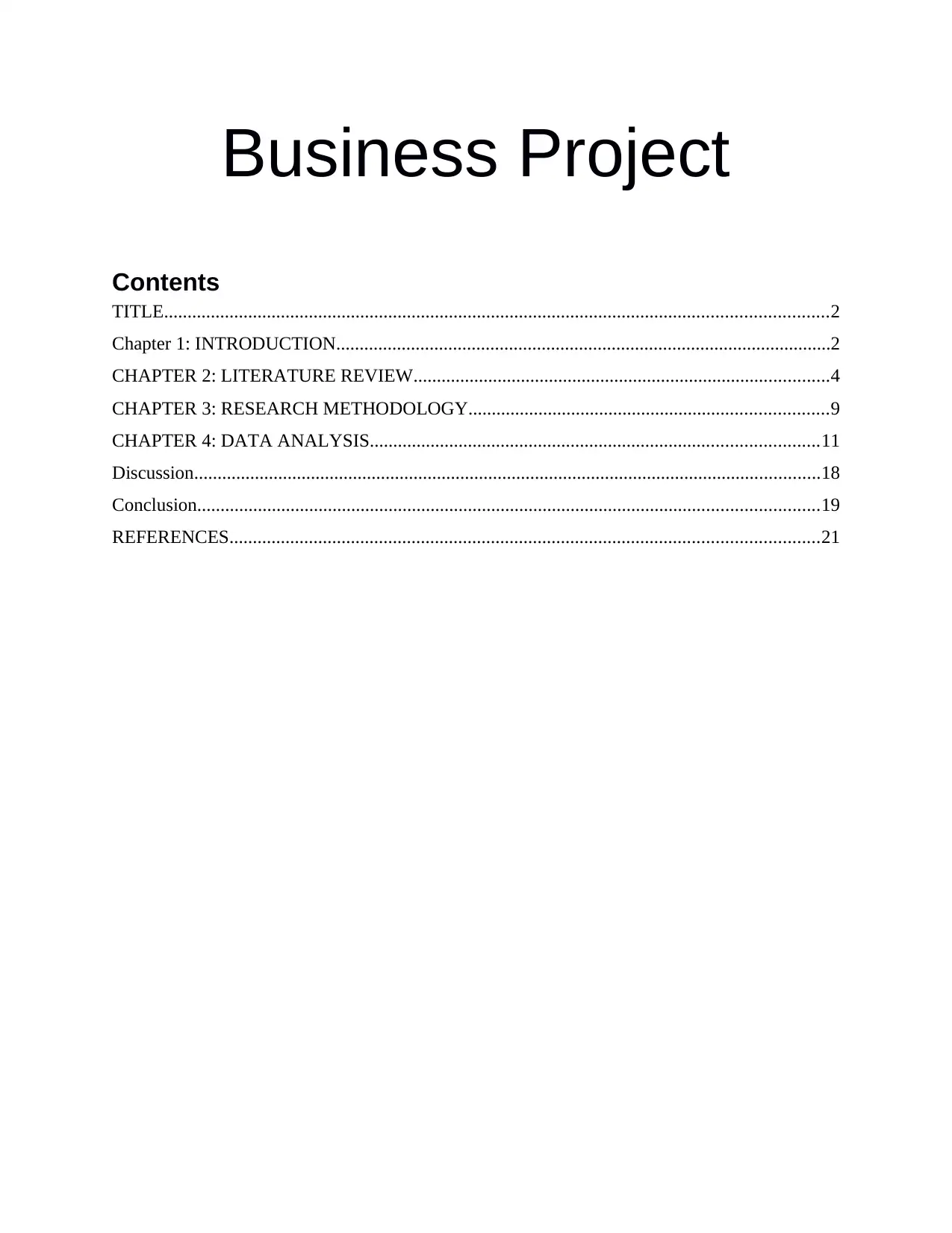
Business Project
Contents
TITLE..............................................................................................................................................2
Chapter 1: INTRODUCTION..........................................................................................................2
CHAPTER 2: LITERATURE REVIEW.........................................................................................4
CHAPTER 3: RESEARCH METHODOLOGY.............................................................................9
CHAPTER 4: DATA ANALYSIS................................................................................................11
Discussion......................................................................................................................................18
Conclusion.....................................................................................................................................19
REFERENCES..............................................................................................................................21
Contents
TITLE..............................................................................................................................................2
Chapter 1: INTRODUCTION..........................................................................................................2
CHAPTER 2: LITERATURE REVIEW.........................................................................................4
CHAPTER 3: RESEARCH METHODOLOGY.............................................................................9
CHAPTER 4: DATA ANALYSIS................................................................................................11
Discussion......................................................................................................................................18
Conclusion.....................................................................................................................................19
REFERENCES..............................................................................................................................21
Secure Best Marks with AI Grader
Need help grading? Try our AI Grader for instant feedback on your assignments.
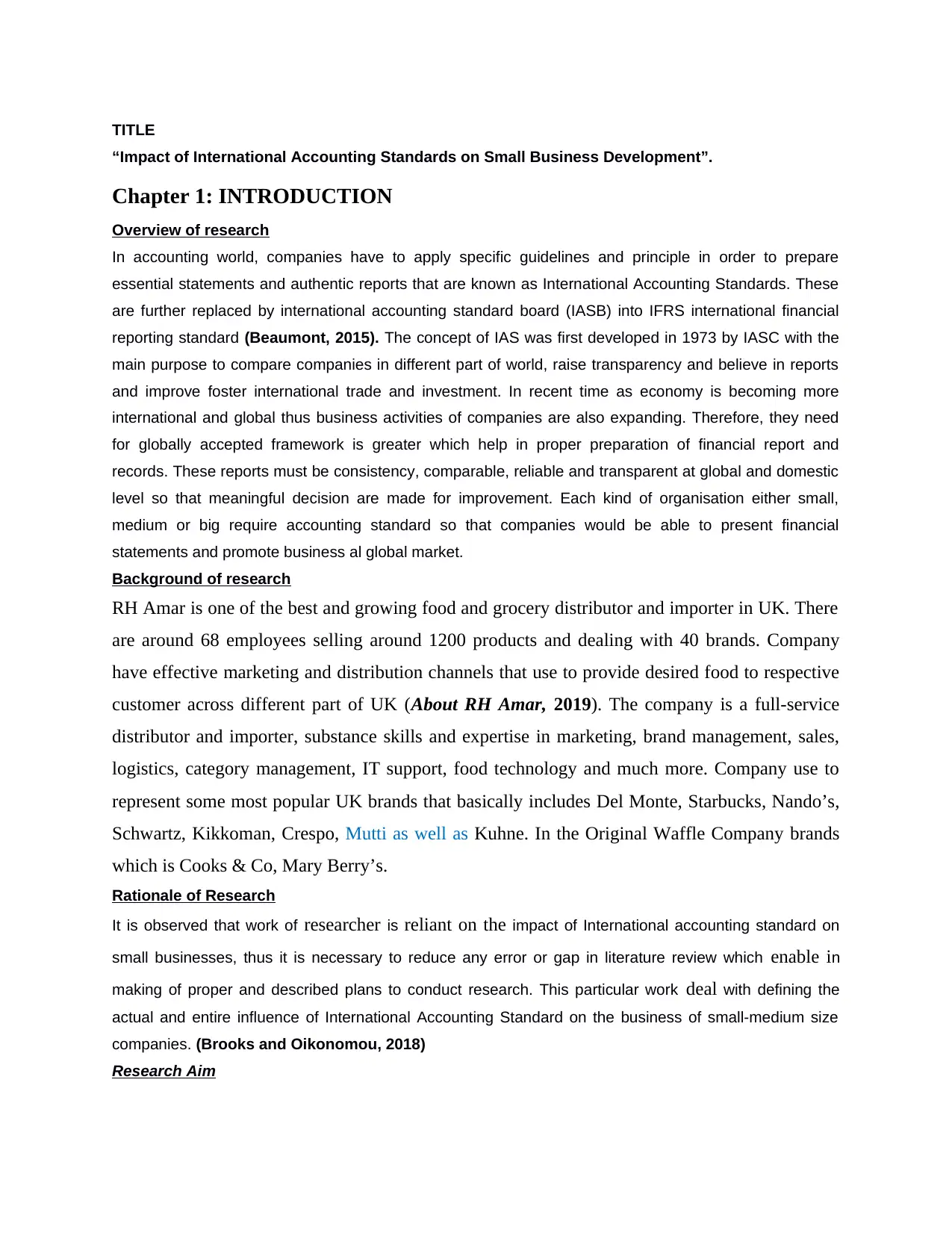
TITLE
“Impact of International Accounting Standards on Small Business Development”.
Chapter 1: INTRODUCTION
Overview of research
In accounting world, companies have to apply specific guidelines and principle in order to prepare
essential statements and authentic reports that are known as International Accounting Standards. These
are further replaced by international accounting standard board (IASB) into IFRS international financial
reporting standard (Beaumont, 2015). The concept of IAS was first developed in 1973 by IASC with the
main purpose to compare companies in different part of world, raise transparency and believe in reports
and improve foster international trade and investment. In recent time as economy is becoming more
international and global thus business activities of companies are also expanding. Therefore, they need
for globally accepted framework is greater which help in proper preparation of financial report and
records. These reports must be consistency, comparable, reliable and transparent at global and domestic
level so that meaningful decision are made for improvement. Each kind of organisation either small,
medium or big require accounting standard so that companies would be able to present financial
statements and promote business al global market.
Background of research
RH Amar is one of the best and growing food and grocery distributor and importer in UK. There
are around 68 employees selling around 1200 products and dealing with 40 brands. Company
have effective marketing and distribution channels that use to provide desired food to respective
customer across different part of UK (About RH Amar, 2019). The company is a full-service
distributor and importer, substance skills and expertise in marketing, brand management, sales,
logistics, category management, IT support, food technology and much more. Company use to
represent some most popular UK brands that basically includes Del Monte, Starbucks, Nando’s,
Schwartz, Kikkoman, Crespo, Mutti as well as Kuhne. In the Original Waffle Company brands
which is Cooks & Co, Mary Berry’s.
Rationale of Research
It is observed that work of researcher is reliant on the impact of International accounting standard on
small businesses, thus it is necessary to reduce any error or gap in literature review which enable in
making of proper and described plans to conduct research. This particular work deal with defining the
actual and entire influence of International Accounting Standard on the business of small-medium size
companies. (Brooks and Oikonomou, 2018)
Research Aim
“Impact of International Accounting Standards on Small Business Development”.
Chapter 1: INTRODUCTION
Overview of research
In accounting world, companies have to apply specific guidelines and principle in order to prepare
essential statements and authentic reports that are known as International Accounting Standards. These
are further replaced by international accounting standard board (IASB) into IFRS international financial
reporting standard (Beaumont, 2015). The concept of IAS was first developed in 1973 by IASC with the
main purpose to compare companies in different part of world, raise transparency and believe in reports
and improve foster international trade and investment. In recent time as economy is becoming more
international and global thus business activities of companies are also expanding. Therefore, they need
for globally accepted framework is greater which help in proper preparation of financial report and
records. These reports must be consistency, comparable, reliable and transparent at global and domestic
level so that meaningful decision are made for improvement. Each kind of organisation either small,
medium or big require accounting standard so that companies would be able to present financial
statements and promote business al global market.
Background of research
RH Amar is one of the best and growing food and grocery distributor and importer in UK. There
are around 68 employees selling around 1200 products and dealing with 40 brands. Company
have effective marketing and distribution channels that use to provide desired food to respective
customer across different part of UK (About RH Amar, 2019). The company is a full-service
distributor and importer, substance skills and expertise in marketing, brand management, sales,
logistics, category management, IT support, food technology and much more. Company use to
represent some most popular UK brands that basically includes Del Monte, Starbucks, Nando’s,
Schwartz, Kikkoman, Crespo, Mutti as well as Kuhne. In the Original Waffle Company brands
which is Cooks & Co, Mary Berry’s.
Rationale of Research
It is observed that work of researcher is reliant on the impact of International accounting standard on
small businesses, thus it is necessary to reduce any error or gap in literature review which enable in
making of proper and described plans to conduct research. This particular work deal with defining the
actual and entire influence of International Accounting Standard on the business of small-medium size
companies. (Brooks and Oikonomou, 2018)
Research Aim
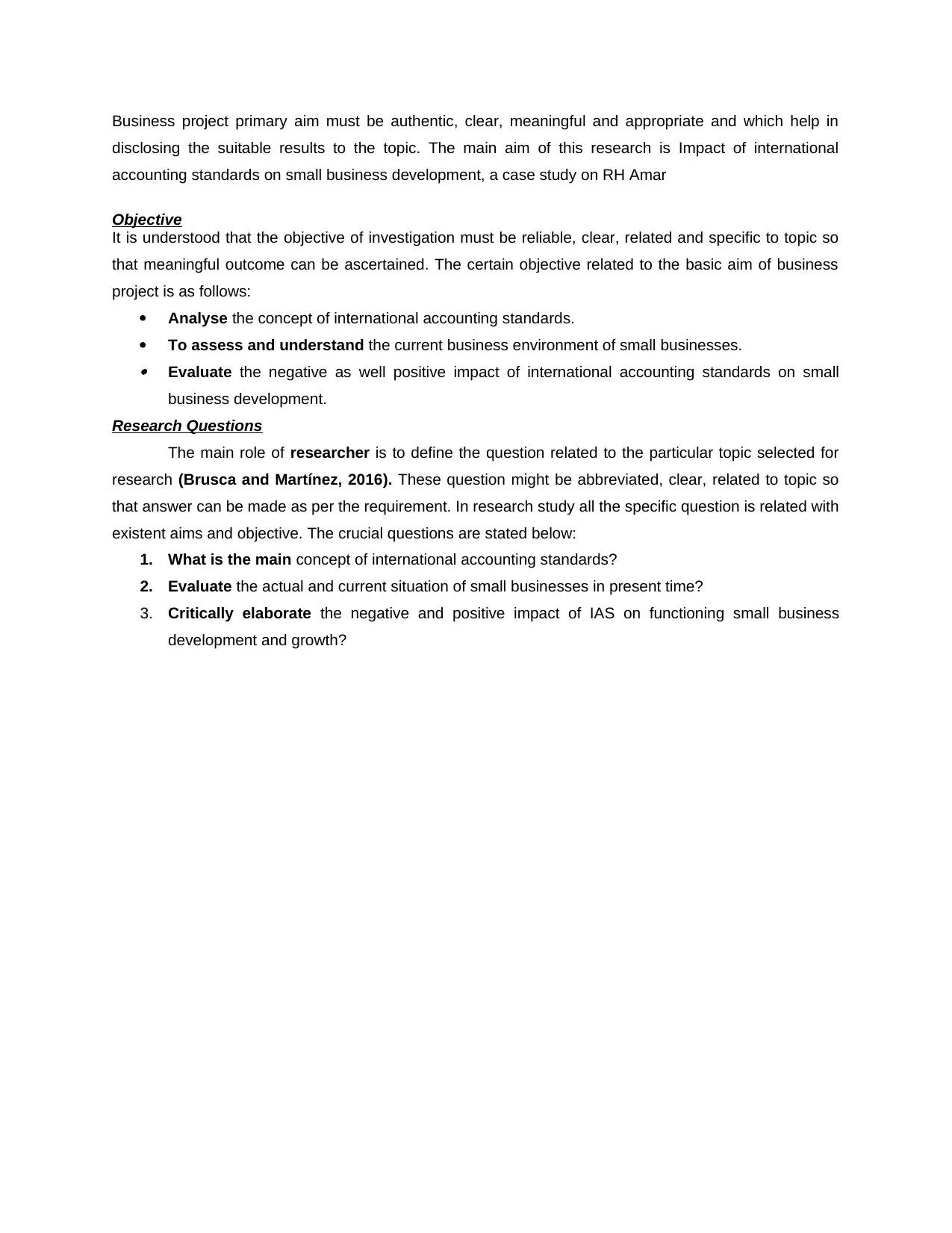
Business project primary aim must be authentic, clear, meaningful and appropriate and which help in
disclosing the suitable results to the topic. The main aim of this research is Impact of international
accounting standards on small business development, a case study on RH Amar
Objective
It is understood that the objective of investigation must be reliable, clear, related and specific to topic so
that meaningful outcome can be ascertained. The certain objective related to the basic aim of business
project is as follows:
Analyse the concept of international accounting standards.
To assess and understand the current business environment of small businesses.
Evaluate the negative as well positive impact of international accounting standards on small
business development.
Research Questions
The main role of researcher is to define the question related to the particular topic selected for
research (Brusca and Martínez, 2016). These question might be abbreviated, clear, related to topic so
that answer can be made as per the requirement. In research study all the specific question is related with
existent aims and objective. The crucial questions are stated below:
1. What is the main concept of international accounting standards?
2. Evaluate the actual and current situation of small businesses in present time?
3. Critically elaborate the negative and positive impact of IAS on functioning small business
development and growth?
disclosing the suitable results to the topic. The main aim of this research is Impact of international
accounting standards on small business development, a case study on RH Amar
Objective
It is understood that the objective of investigation must be reliable, clear, related and specific to topic so
that meaningful outcome can be ascertained. The certain objective related to the basic aim of business
project is as follows:
Analyse the concept of international accounting standards.
To assess and understand the current business environment of small businesses.
Evaluate the negative as well positive impact of international accounting standards on small
business development.
Research Questions
The main role of researcher is to define the question related to the particular topic selected for
research (Brusca and Martínez, 2016). These question might be abbreviated, clear, related to topic so
that answer can be made as per the requirement. In research study all the specific question is related with
existent aims and objective. The crucial questions are stated below:
1. What is the main concept of international accounting standards?
2. Evaluate the actual and current situation of small businesses in present time?
3. Critically elaborate the negative and positive impact of IAS on functioning small business
development and growth?
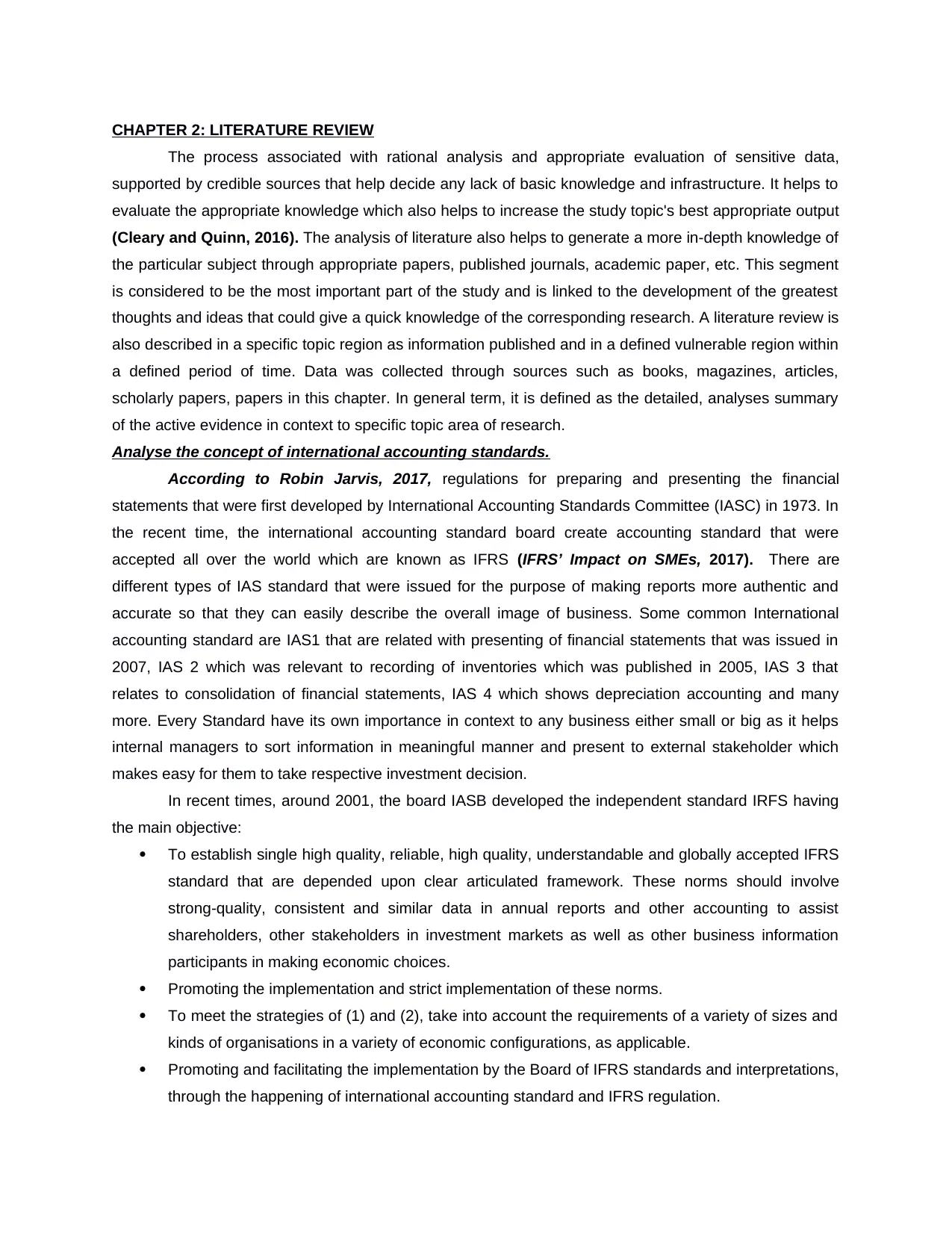
CHAPTER 2: LITERATURE REVIEW
The process associated with rational analysis and appropriate evaluation of sensitive data,
supported by credible sources that help decide any lack of basic knowledge and infrastructure. It helps to
evaluate the appropriate knowledge which also helps to increase the study topic's best appropriate output
(Cleary and Quinn, 2016). The analysis of literature also helps to generate a more in-depth knowledge of
the particular subject through appropriate papers, published journals, academic paper, etc. This segment
is considered to be the most important part of the study and is linked to the development of the greatest
thoughts and ideas that could give a quick knowledge of the corresponding research. A literature review is
also described in a specific topic region as information published and in a defined vulnerable region within
a defined period of time. Data was collected through sources such as books, magazines, articles,
scholarly papers, papers in this chapter. In general term, it is defined as the detailed, analyses summary
of the active evidence in context to specific topic area of research.
Analyse the concept of international accounting standards.
According to Robin Jarvis, 2017, regulations for preparing and presenting the financial
statements that were first developed by International Accounting Standards Committee (IASC) in 1973. In
the recent time, the international accounting standard board create accounting standard that were
accepted all over the world which are known as IFRS (IFRS’ Impact on SMEs, 2017). There are
different types of IAS standard that were issued for the purpose of making reports more authentic and
accurate so that they can easily describe the overall image of business. Some common International
accounting standard are IAS1 that are related with presenting of financial statements that was issued in
2007, IAS 2 which was relevant to recording of inventories which was published in 2005, IAS 3 that
relates to consolidation of financial statements, IAS 4 which shows depreciation accounting and many
more. Every Standard have its own importance in context to any business either small or big as it helps
internal managers to sort information in meaningful manner and present to external stakeholder which
makes easy for them to take respective investment decision.
In recent times, around 2001, the board IASB developed the independent standard IRFS having
the main objective:
To establish single high quality, reliable, high quality, understandable and globally accepted IFRS
standard that are depended upon clear articulated framework. These norms should involve
strong-quality, consistent and similar data in annual reports and other accounting to assist
shareholders, other stakeholders in investment markets as well as other business information
participants in making economic choices.
Promoting the implementation and strict implementation of these norms.
To meet the strategies of (1) and (2), take into account the requirements of a variety of sizes and
kinds of organisations in a variety of economic configurations, as applicable.
Promoting and facilitating the implementation by the Board of IFRS standards and interpretations,
through the happening of international accounting standard and IFRS regulation.
The process associated with rational analysis and appropriate evaluation of sensitive data,
supported by credible sources that help decide any lack of basic knowledge and infrastructure. It helps to
evaluate the appropriate knowledge which also helps to increase the study topic's best appropriate output
(Cleary and Quinn, 2016). The analysis of literature also helps to generate a more in-depth knowledge of
the particular subject through appropriate papers, published journals, academic paper, etc. This segment
is considered to be the most important part of the study and is linked to the development of the greatest
thoughts and ideas that could give a quick knowledge of the corresponding research. A literature review is
also described in a specific topic region as information published and in a defined vulnerable region within
a defined period of time. Data was collected through sources such as books, magazines, articles,
scholarly papers, papers in this chapter. In general term, it is defined as the detailed, analyses summary
of the active evidence in context to specific topic area of research.
Analyse the concept of international accounting standards.
According to Robin Jarvis, 2017, regulations for preparing and presenting the financial
statements that were first developed by International Accounting Standards Committee (IASC) in 1973. In
the recent time, the international accounting standard board create accounting standard that were
accepted all over the world which are known as IFRS (IFRS’ Impact on SMEs, 2017). There are
different types of IAS standard that were issued for the purpose of making reports more authentic and
accurate so that they can easily describe the overall image of business. Some common International
accounting standard are IAS1 that are related with presenting of financial statements that was issued in
2007, IAS 2 which was relevant to recording of inventories which was published in 2005, IAS 3 that
relates to consolidation of financial statements, IAS 4 which shows depreciation accounting and many
more. Every Standard have its own importance in context to any business either small or big as it helps
internal managers to sort information in meaningful manner and present to external stakeholder which
makes easy for them to take respective investment decision.
In recent times, around 2001, the board IASB developed the independent standard IRFS having
the main objective:
To establish single high quality, reliable, high quality, understandable and globally accepted IFRS
standard that are depended upon clear articulated framework. These norms should involve
strong-quality, consistent and similar data in annual reports and other accounting to assist
shareholders, other stakeholders in investment markets as well as other business information
participants in making economic choices.
Promoting the implementation and strict implementation of these norms.
To meet the strategies of (1) and (2), take into account the requirements of a variety of sizes and
kinds of organisations in a variety of economic configurations, as applicable.
Promoting and facilitating the implementation by the Board of IFRS standards and interpretations,
through the happening of international accounting standard and IFRS regulation.
Secure Best Marks with AI Grader
Need help grading? Try our AI Grader for instant feedback on your assignments.
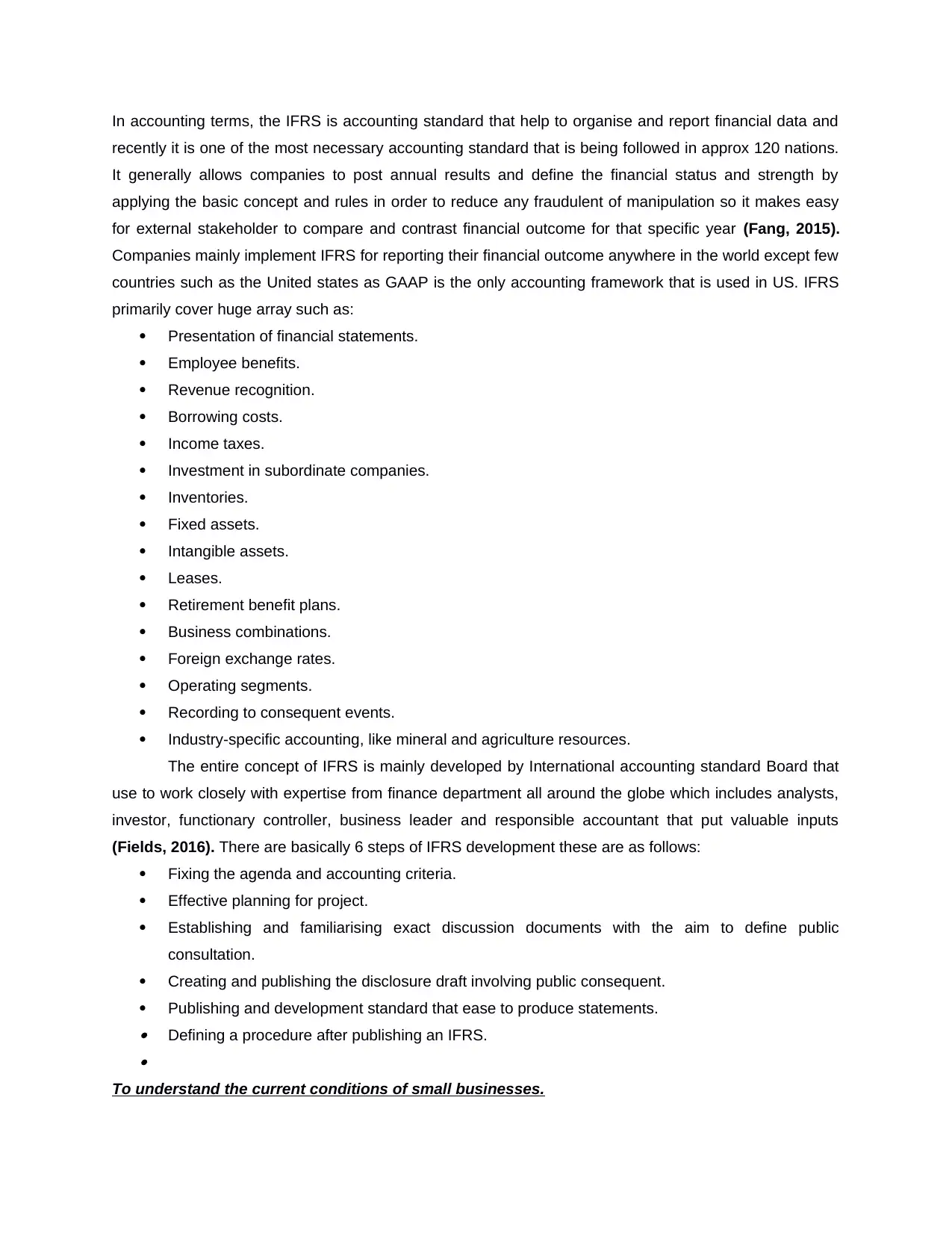
In accounting terms, the IFRS is accounting standard that help to organise and report financial data and
recently it is one of the most necessary accounting standard that is being followed in approx 120 nations.
It generally allows companies to post annual results and define the financial status and strength by
applying the basic concept and rules in order to reduce any fraudulent of manipulation so it makes easy
for external stakeholder to compare and contrast financial outcome for that specific year (Fang, 2015).
Companies mainly implement IFRS for reporting their financial outcome anywhere in the world except few
countries such as the United states as GAAP is the only accounting framework that is used in US. IFRS
primarily cover huge array such as:
Presentation of financial statements.
Employee benefits.
Revenue recognition.
Borrowing costs.
Income taxes.
Investment in subordinate companies.
Inventories.
Fixed assets.
Intangible assets.
Leases.
Retirement benefit plans.
Business combinations.
Foreign exchange rates.
Operating segments.
Recording to consequent events.
Industry-specific accounting, like mineral and agriculture resources.
The entire concept of IFRS is mainly developed by International accounting standard Board that
use to work closely with expertise from finance department all around the globe which includes analysts,
investor, functionary controller, business leader and responsible accountant that put valuable inputs
(Fields, 2016). There are basically 6 steps of IFRS development these are as follows:
Fixing the agenda and accounting criteria.
Effective planning for project.
Establishing and familiarising exact discussion documents with the aim to define public
consultation.
Creating and publishing the disclosure draft involving public consequent.
Publishing and development standard that ease to produce statements.
Defining a procedure after publishing an IFRS.
To understand the current conditions of small businesses.
recently it is one of the most necessary accounting standard that is being followed in approx 120 nations.
It generally allows companies to post annual results and define the financial status and strength by
applying the basic concept and rules in order to reduce any fraudulent of manipulation so it makes easy
for external stakeholder to compare and contrast financial outcome for that specific year (Fang, 2015).
Companies mainly implement IFRS for reporting their financial outcome anywhere in the world except few
countries such as the United states as GAAP is the only accounting framework that is used in US. IFRS
primarily cover huge array such as:
Presentation of financial statements.
Employee benefits.
Revenue recognition.
Borrowing costs.
Income taxes.
Investment in subordinate companies.
Inventories.
Fixed assets.
Intangible assets.
Leases.
Retirement benefit plans.
Business combinations.
Foreign exchange rates.
Operating segments.
Recording to consequent events.
Industry-specific accounting, like mineral and agriculture resources.
The entire concept of IFRS is mainly developed by International accounting standard Board that
use to work closely with expertise from finance department all around the globe which includes analysts,
investor, functionary controller, business leader and responsible accountant that put valuable inputs
(Fields, 2016). There are basically 6 steps of IFRS development these are as follows:
Fixing the agenda and accounting criteria.
Effective planning for project.
Establishing and familiarising exact discussion documents with the aim to define public
consultation.
Creating and publishing the disclosure draft involving public consequent.
Publishing and development standard that ease to produce statements.
Defining a procedure after publishing an IFRS.
To understand the current conditions of small businesses.
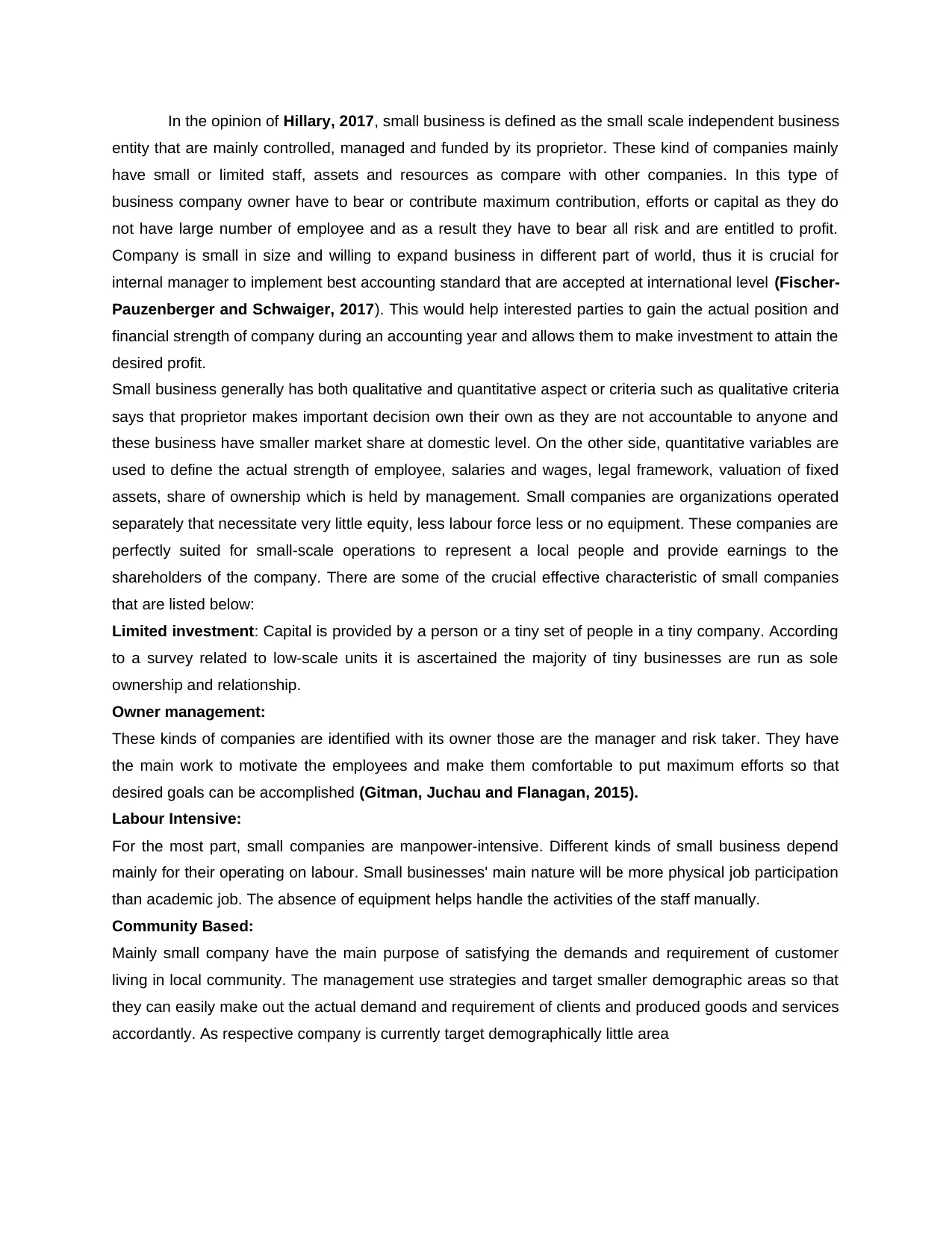
In the opinion of Hillary, 2017, small business is defined as the small scale independent business
entity that are mainly controlled, managed and funded by its proprietor. These kind of companies mainly
have small or limited staff, assets and resources as compare with other companies. In this type of
business company owner have to bear or contribute maximum contribution, efforts or capital as they do
not have large number of employee and as a result they have to bear all risk and are entitled to profit.
Company is small in size and willing to expand business in different part of world, thus it is crucial for
internal manager to implement best accounting standard that are accepted at international level (Fischer-
Pauzenberger and Schwaiger, 2017). This would help interested parties to gain the actual position and
financial strength of company during an accounting year and allows them to make investment to attain the
desired profit.
Small business generally has both qualitative and quantitative aspect or criteria such as qualitative criteria
says that proprietor makes important decision own their own as they are not accountable to anyone and
these business have smaller market share at domestic level. On the other side, quantitative variables are
used to define the actual strength of employee, salaries and wages, legal framework, valuation of fixed
assets, share of ownership which is held by management. Small companies are organizations operated
separately that necessitate very little equity, less labour force less or no equipment. These companies are
perfectly suited for small-scale operations to represent a local people and provide earnings to the
shareholders of the company. There are some of the crucial effective characteristic of small companies
that are listed below:
Limited investment: Capital is provided by a person or a tiny set of people in a tiny company. According
to a survey related to low-scale units it is ascertained the majority of tiny businesses are run as sole
ownership and relationship.
Owner management:
These kinds of companies are identified with its owner those are the manager and risk taker. They have
the main work to motivate the employees and make them comfortable to put maximum efforts so that
desired goals can be accomplished (Gitman, Juchau and Flanagan, 2015).
Labour Intensive:
For the most part, small companies are manpower-intensive. Different kinds of small business depend
mainly for their operating on labour. Small businesses' main nature will be more physical job participation
than academic job. The absence of equipment helps handle the activities of the staff manually.
Community Based:
Mainly small company have the main purpose of satisfying the demands and requirement of customer
living in local community. The management use strategies and target smaller demographic areas so that
they can easily make out the actual demand and requirement of clients and produced goods and services
accordantly. As respective company is currently target demographically little area
entity that are mainly controlled, managed and funded by its proprietor. These kind of companies mainly
have small or limited staff, assets and resources as compare with other companies. In this type of
business company owner have to bear or contribute maximum contribution, efforts or capital as they do
not have large number of employee and as a result they have to bear all risk and are entitled to profit.
Company is small in size and willing to expand business in different part of world, thus it is crucial for
internal manager to implement best accounting standard that are accepted at international level (Fischer-
Pauzenberger and Schwaiger, 2017). This would help interested parties to gain the actual position and
financial strength of company during an accounting year and allows them to make investment to attain the
desired profit.
Small business generally has both qualitative and quantitative aspect or criteria such as qualitative criteria
says that proprietor makes important decision own their own as they are not accountable to anyone and
these business have smaller market share at domestic level. On the other side, quantitative variables are
used to define the actual strength of employee, salaries and wages, legal framework, valuation of fixed
assets, share of ownership which is held by management. Small companies are organizations operated
separately that necessitate very little equity, less labour force less or no equipment. These companies are
perfectly suited for small-scale operations to represent a local people and provide earnings to the
shareholders of the company. There are some of the crucial effective characteristic of small companies
that are listed below:
Limited investment: Capital is provided by a person or a tiny set of people in a tiny company. According
to a survey related to low-scale units it is ascertained the majority of tiny businesses are run as sole
ownership and relationship.
Owner management:
These kinds of companies are identified with its owner those are the manager and risk taker. They have
the main work to motivate the employees and make them comfortable to put maximum efforts so that
desired goals can be accomplished (Gitman, Juchau and Flanagan, 2015).
Labour Intensive:
For the most part, small companies are manpower-intensive. Different kinds of small business depend
mainly for their operating on labour. Small businesses' main nature will be more physical job participation
than academic job. The absence of equipment helps handle the activities of the staff manually.
Community Based:
Mainly small company have the main purpose of satisfying the demands and requirement of customer
living in local community. The management use strategies and target smaller demographic areas so that
they can easily make out the actual demand and requirement of clients and produced goods and services
accordantly. As respective company is currently target demographically little area
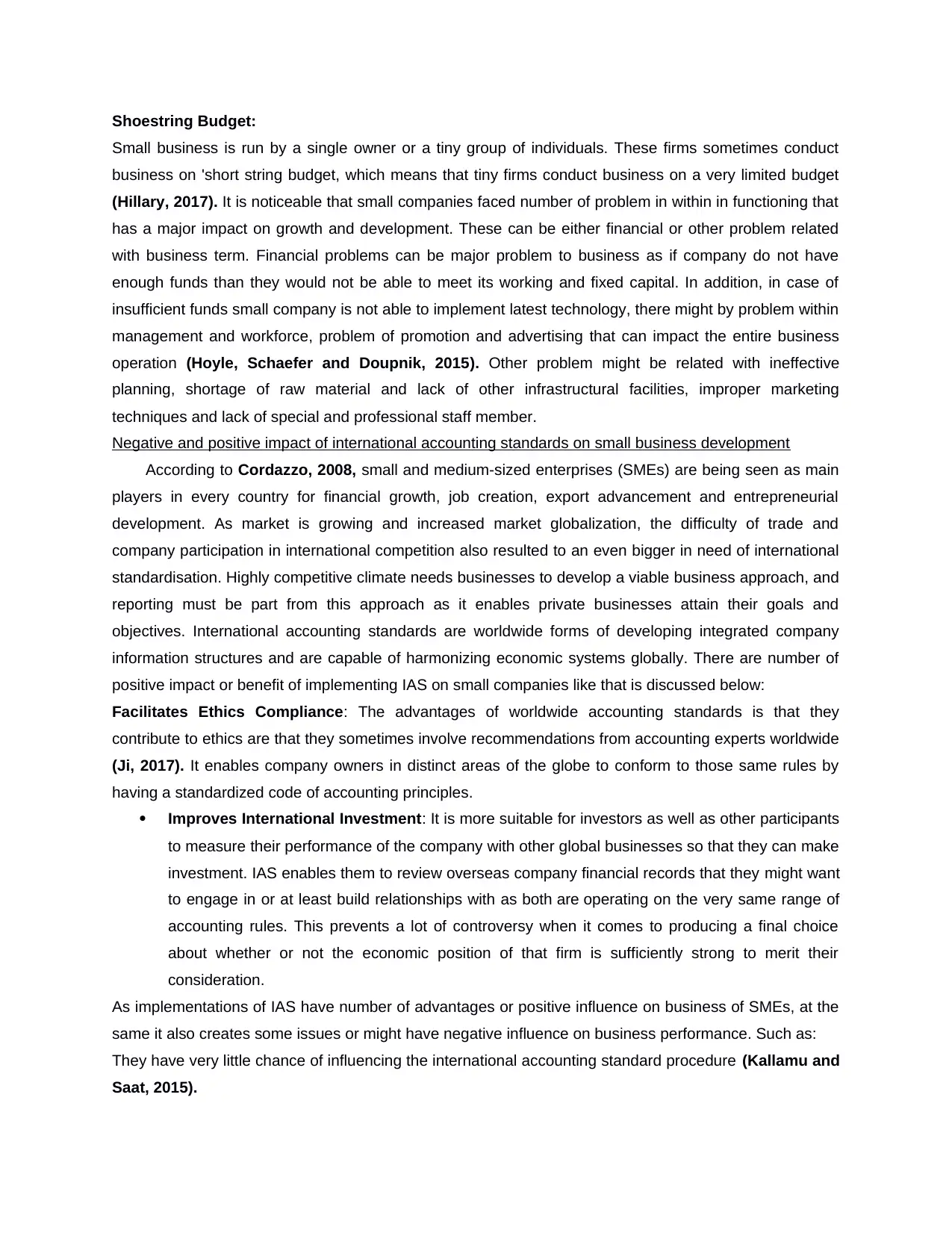
Shoestring Budget:
Small business is run by a single owner or a tiny group of individuals. These firms sometimes conduct
business on 'short string budget, which means that tiny firms conduct business on a very limited budget
(Hillary, 2017). It is noticeable that small companies faced number of problem in within in functioning that
has a major impact on growth and development. These can be either financial or other problem related
with business term. Financial problems can be major problem to business as if company do not have
enough funds than they would not be able to meet its working and fixed capital. In addition, in case of
insufficient funds small company is not able to implement latest technology, there might by problem within
management and workforce, problem of promotion and advertising that can impact the entire business
operation (Hoyle, Schaefer and Doupnik, 2015). Other problem might be related with ineffective
planning, shortage of raw material and lack of other infrastructural facilities, improper marketing
techniques and lack of special and professional staff member.
Negative and positive impact of international accounting standards on small business development
According to Cordazzo, 2008, small and medium-sized enterprises (SMEs) are being seen as main
players in every country for financial growth, job creation, export advancement and entrepreneurial
development. As market is growing and increased market globalization, the difficulty of trade and
company participation in international competition also resulted to an even bigger in need of international
standardisation. Highly competitive climate needs businesses to develop a viable business approach, and
reporting must be part from this approach as it enables private businesses attain their goals and
objectives. International accounting standards are worldwide forms of developing integrated company
information structures and are capable of harmonizing economic systems globally. There are number of
positive impact or benefit of implementing IAS on small companies like that is discussed below:
Facilitates Ethics Compliance: The advantages of worldwide accounting standards is that they
contribute to ethics are that they sometimes involve recommendations from accounting experts worldwide
(Ji, 2017). It enables company owners in distinct areas of the globe to conform to those same rules by
having a standardized code of accounting principles.
Improves International Investment: It is more suitable for investors as well as other participants
to measure their performance of the company with other global businesses so that they can make
investment. IAS enables them to review overseas company financial records that they might want
to engage in or at least build relationships with as both are operating on the very same range of
accounting rules. This prevents a lot of controversy when it comes to producing a final choice
about whether or not the economic position of that firm is sufficiently strong to merit their
consideration.
As implementations of IAS have number of advantages or positive influence on business of SMEs, at the
same it also creates some issues or might have negative influence on business performance. Such as:
They have very little chance of influencing the international accounting standard procedure (Kallamu and
Saat, 2015).
Small business is run by a single owner or a tiny group of individuals. These firms sometimes conduct
business on 'short string budget, which means that tiny firms conduct business on a very limited budget
(Hillary, 2017). It is noticeable that small companies faced number of problem in within in functioning that
has a major impact on growth and development. These can be either financial or other problem related
with business term. Financial problems can be major problem to business as if company do not have
enough funds than they would not be able to meet its working and fixed capital. In addition, in case of
insufficient funds small company is not able to implement latest technology, there might by problem within
management and workforce, problem of promotion and advertising that can impact the entire business
operation (Hoyle, Schaefer and Doupnik, 2015). Other problem might be related with ineffective
planning, shortage of raw material and lack of other infrastructural facilities, improper marketing
techniques and lack of special and professional staff member.
Negative and positive impact of international accounting standards on small business development
According to Cordazzo, 2008, small and medium-sized enterprises (SMEs) are being seen as main
players in every country for financial growth, job creation, export advancement and entrepreneurial
development. As market is growing and increased market globalization, the difficulty of trade and
company participation in international competition also resulted to an even bigger in need of international
standardisation. Highly competitive climate needs businesses to develop a viable business approach, and
reporting must be part from this approach as it enables private businesses attain their goals and
objectives. International accounting standards are worldwide forms of developing integrated company
information structures and are capable of harmonizing economic systems globally. There are number of
positive impact or benefit of implementing IAS on small companies like that is discussed below:
Facilitates Ethics Compliance: The advantages of worldwide accounting standards is that they
contribute to ethics are that they sometimes involve recommendations from accounting experts worldwide
(Ji, 2017). It enables company owners in distinct areas of the globe to conform to those same rules by
having a standardized code of accounting principles.
Improves International Investment: It is more suitable for investors as well as other participants
to measure their performance of the company with other global businesses so that they can make
investment. IAS enables them to review overseas company financial records that they might want
to engage in or at least build relationships with as both are operating on the very same range of
accounting rules. This prevents a lot of controversy when it comes to producing a final choice
about whether or not the economic position of that firm is sufficiently strong to merit their
consideration.
As implementations of IAS have number of advantages or positive influence on business of SMEs, at the
same it also creates some issues or might have negative influence on business performance. Such as:
They have very little chance of influencing the international accounting standard procedure (Kallamu and
Saat, 2015).
Paraphrase This Document
Need a fresh take? Get an instant paraphrase of this document with our AI Paraphraser
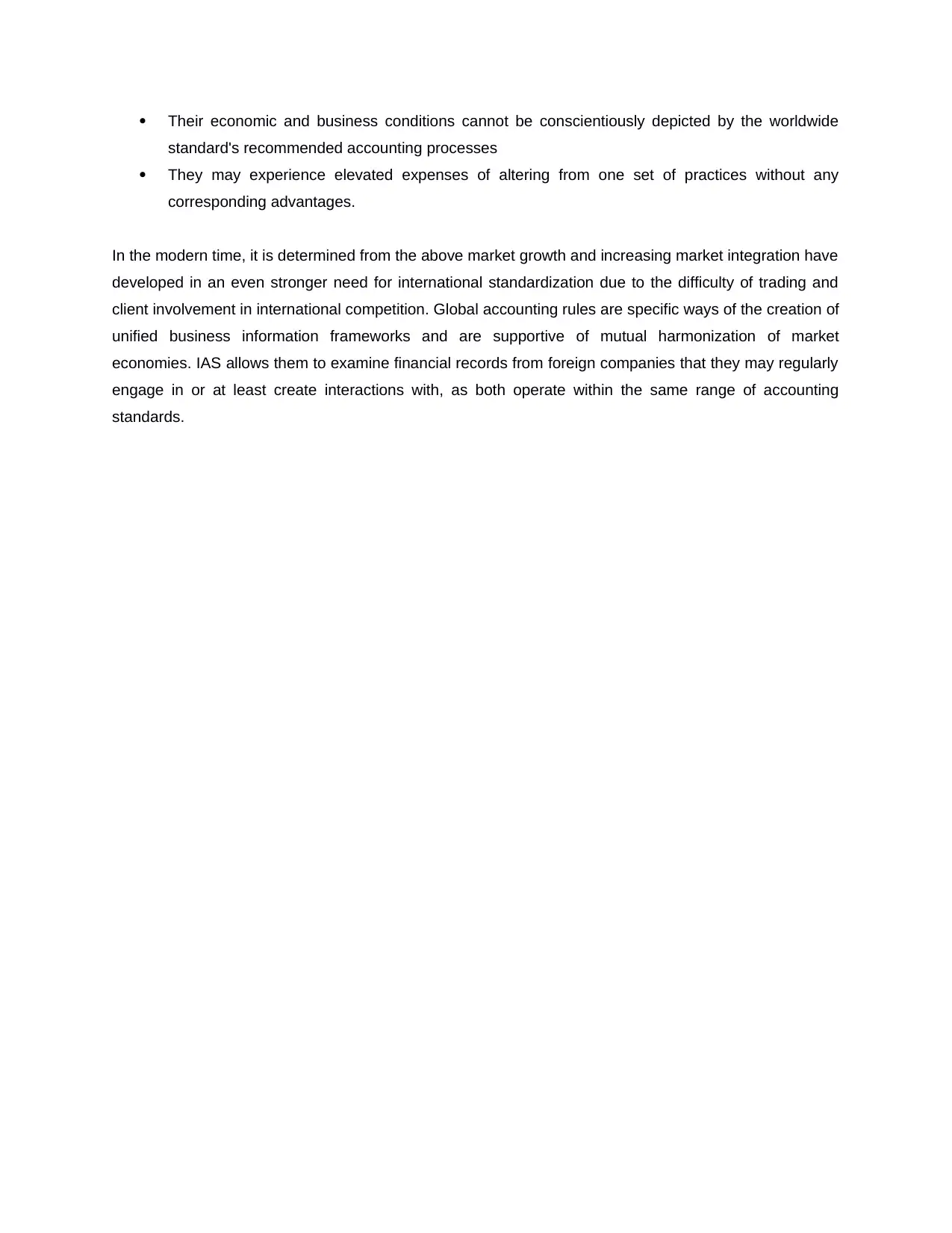
Their economic and business conditions cannot be conscientiously depicted by the worldwide
standard's recommended accounting processes
They may experience elevated expenses of altering from one set of practices without any
corresponding advantages.
In the modern time, it is determined from the above market growth and increasing market integration have
developed in an even stronger need for international standardization due to the difficulty of trading and
client involvement in international competition. Global accounting rules are specific ways of the creation of
unified business information frameworks and are supportive of mutual harmonization of market
economies. IAS allows them to examine financial records from foreign companies that they may regularly
engage in or at least create interactions with, as both operate within the same range of accounting
standards.
standard's recommended accounting processes
They may experience elevated expenses of altering from one set of practices without any
corresponding advantages.
In the modern time, it is determined from the above market growth and increasing market integration have
developed in an even stronger need for international standardization due to the difficulty of trading and
client involvement in international competition. Global accounting rules are specific ways of the creation of
unified business information frameworks and are supportive of mutual harmonization of market
economies. IAS allows them to examine financial records from foreign companies that they may regularly
engage in or at least create interactions with, as both operate within the same range of accounting
standards.
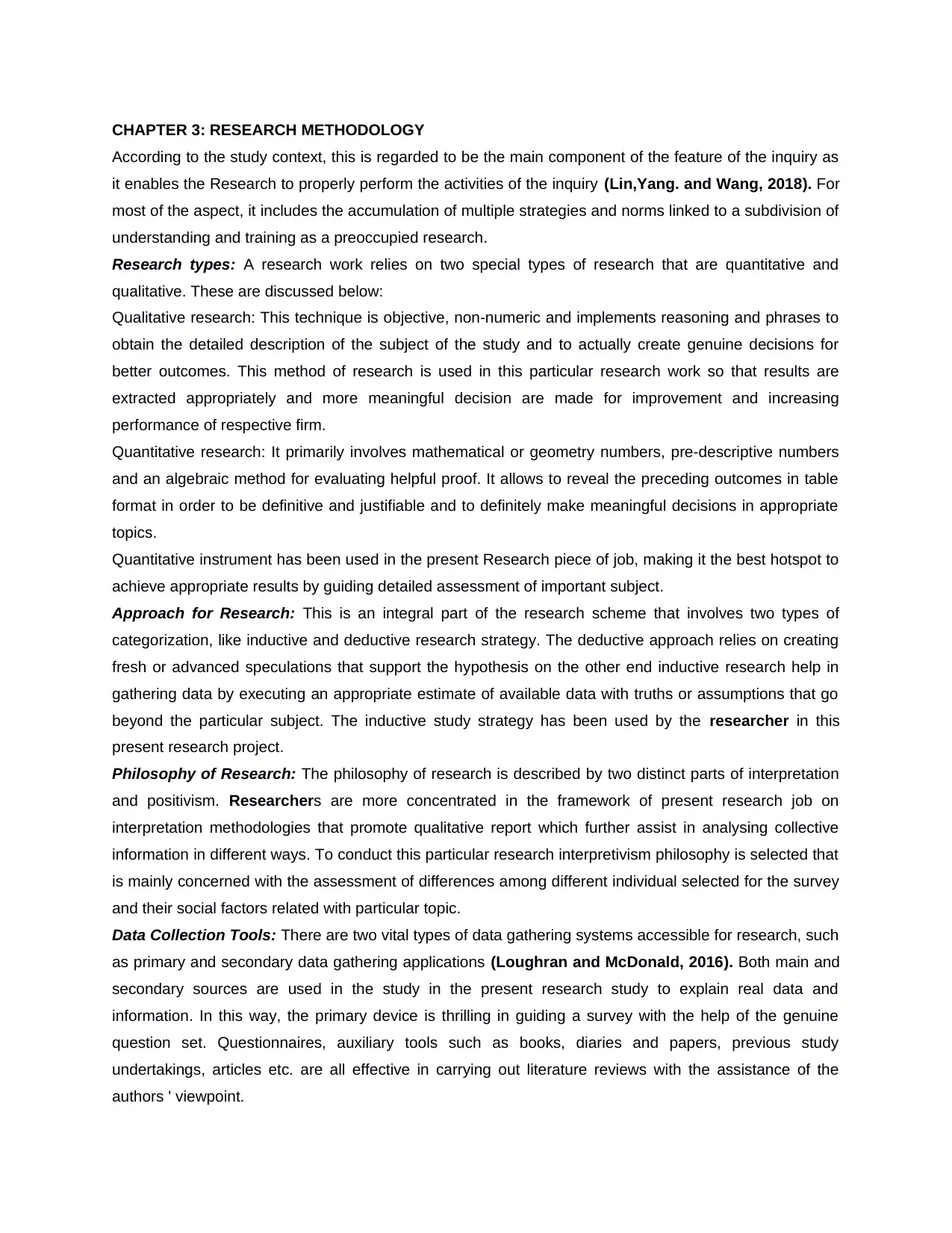
CHAPTER 3: RESEARCH METHODOLOGY
According to the study context, this is regarded to be the main component of the feature of the inquiry as
it enables the Research to properly perform the activities of the inquiry (Lin,Yang. and Wang, 2018). For
most of the aspect, it includes the accumulation of multiple strategies and norms linked to a subdivision of
understanding and training as a preoccupied research.
Research types: A research work relies on two special types of research that are quantitative and
qualitative. These are discussed below:
Qualitative research: This technique is objective, non-numeric and implements reasoning and phrases to
obtain the detailed description of the subject of the study and to actually create genuine decisions for
better outcomes. This method of research is used in this particular research work so that results are
extracted appropriately and more meaningful decision are made for improvement and increasing
performance of respective firm.
Quantitative research: It primarily involves mathematical or geometry numbers, pre-descriptive numbers
and an algebraic method for evaluating helpful proof. It allows to reveal the preceding outcomes in table
format in order to be definitive and justifiable and to definitely make meaningful decisions in appropriate
topics.
Quantitative instrument has been used in the present Research piece of job, making it the best hotspot to
achieve appropriate results by guiding detailed assessment of important subject.
Approach for Research: This is an integral part of the research scheme that involves two types of
categorization, like inductive and deductive research strategy. The deductive approach relies on creating
fresh or advanced speculations that support the hypothesis on the other end inductive research help in
gathering data by executing an appropriate estimate of available data with truths or assumptions that go
beyond the particular subject. The inductive study strategy has been used by the researcher in this
present research project.
Philosophy of Research: The philosophy of research is described by two distinct parts of interpretation
and positivism. Researchers are more concentrated in the framework of present research job on
interpretation methodologies that promote qualitative report which further assist in analysing collective
information in different ways. To conduct this particular research interpretivism philosophy is selected that
is mainly concerned with the assessment of differences among different individual selected for the survey
and their social factors related with particular topic.
Data Collection Tools: There are two vital types of data gathering systems accessible for research, such
as primary and secondary data gathering applications (Loughran and McDonald, 2016). Both main and
secondary sources are used in the study in the present research study to explain real data and
information. In this way, the primary device is thrilling in guiding a survey with the help of the genuine
question set. Questionnaires, auxiliary tools such as books, diaries and papers, previous study
undertakings, articles etc. are all effective in carrying out literature reviews with the assistance of the
authors ' viewpoint.
According to the study context, this is regarded to be the main component of the feature of the inquiry as
it enables the Research to properly perform the activities of the inquiry (Lin,Yang. and Wang, 2018). For
most of the aspect, it includes the accumulation of multiple strategies and norms linked to a subdivision of
understanding and training as a preoccupied research.
Research types: A research work relies on two special types of research that are quantitative and
qualitative. These are discussed below:
Qualitative research: This technique is objective, non-numeric and implements reasoning and phrases to
obtain the detailed description of the subject of the study and to actually create genuine decisions for
better outcomes. This method of research is used in this particular research work so that results are
extracted appropriately and more meaningful decision are made for improvement and increasing
performance of respective firm.
Quantitative research: It primarily involves mathematical or geometry numbers, pre-descriptive numbers
and an algebraic method for evaluating helpful proof. It allows to reveal the preceding outcomes in table
format in order to be definitive and justifiable and to definitely make meaningful decisions in appropriate
topics.
Quantitative instrument has been used in the present Research piece of job, making it the best hotspot to
achieve appropriate results by guiding detailed assessment of important subject.
Approach for Research: This is an integral part of the research scheme that involves two types of
categorization, like inductive and deductive research strategy. The deductive approach relies on creating
fresh or advanced speculations that support the hypothesis on the other end inductive research help in
gathering data by executing an appropriate estimate of available data with truths or assumptions that go
beyond the particular subject. The inductive study strategy has been used by the researcher in this
present research project.
Philosophy of Research: The philosophy of research is described by two distinct parts of interpretation
and positivism. Researchers are more concentrated in the framework of present research job on
interpretation methodologies that promote qualitative report which further assist in analysing collective
information in different ways. To conduct this particular research interpretivism philosophy is selected that
is mainly concerned with the assessment of differences among different individual selected for the survey
and their social factors related with particular topic.
Data Collection Tools: There are two vital types of data gathering systems accessible for research, such
as primary and secondary data gathering applications (Loughran and McDonald, 2016). Both main and
secondary sources are used in the study in the present research study to explain real data and
information. In this way, the primary device is thrilling in guiding a survey with the help of the genuine
question set. Questionnaires, auxiliary tools such as books, diaries and papers, previous study
undertakings, articles etc. are all effective in carrying out literature reviews with the assistance of the
authors ' viewpoint.
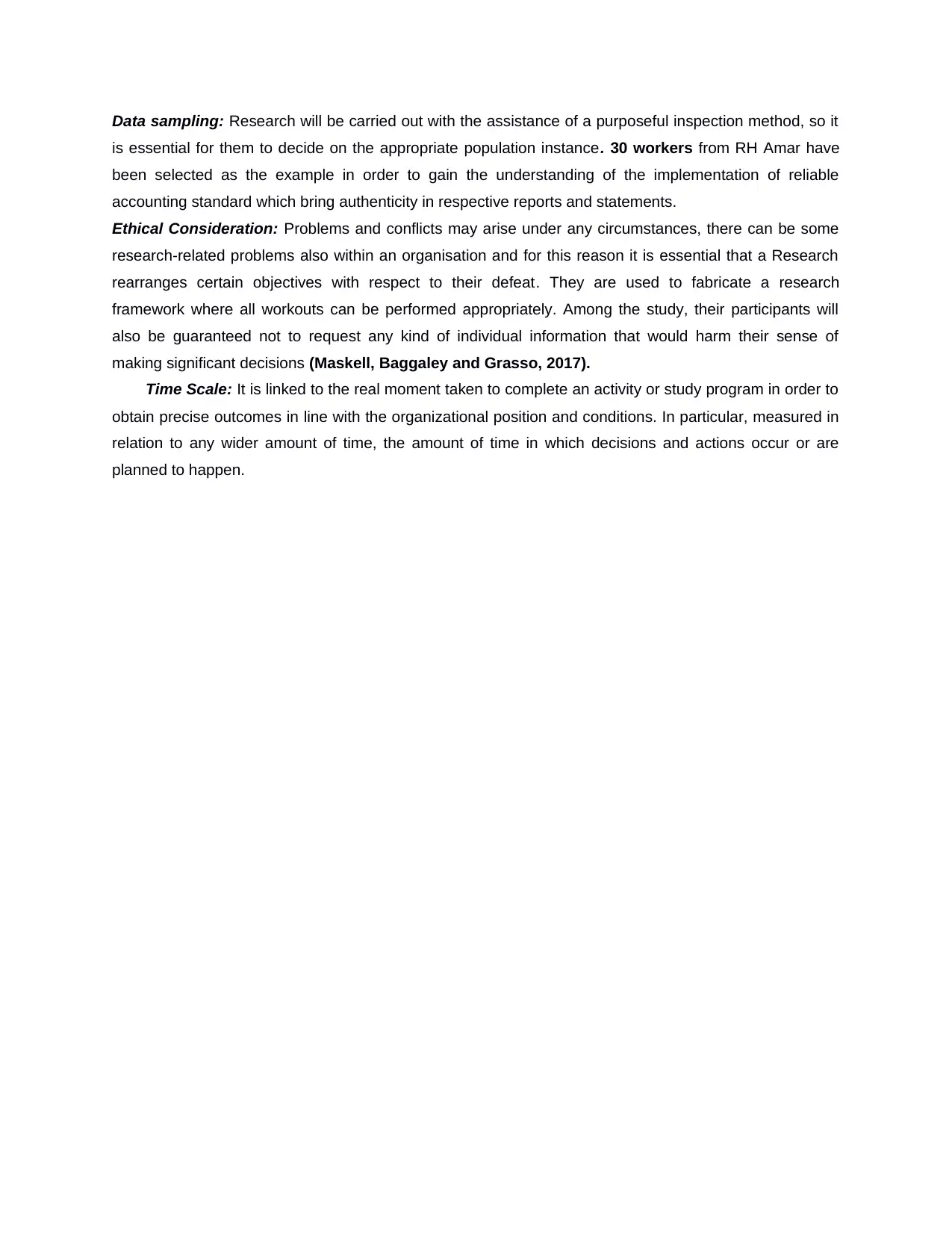
Data sampling: Research will be carried out with the assistance of a purposeful inspection method, so it
is essential for them to decide on the appropriate population instance. 30 workers from RH Amar have
been selected as the example in order to gain the understanding of the implementation of reliable
accounting standard which bring authenticity in respective reports and statements.
Ethical Consideration: Problems and conflicts may arise under any circumstances, there can be some
research-related problems also within an organisation and for this reason it is essential that a Research
rearranges certain objectives with respect to their defeat. They are used to fabricate a research
framework where all workouts can be performed appropriately. Among the study, their participants will
also be guaranteed not to request any kind of individual information that would harm their sense of
making significant decisions (Maskell, Baggaley and Grasso, 2017).
Time Scale: It is linked to the real moment taken to complete an activity or study program in order to
obtain precise outcomes in line with the organizational position and conditions. In particular, measured in
relation to any wider amount of time, the amount of time in which decisions and actions occur or are
planned to happen.
is essential for them to decide on the appropriate population instance. 30 workers from RH Amar have
been selected as the example in order to gain the understanding of the implementation of reliable
accounting standard which bring authenticity in respective reports and statements.
Ethical Consideration: Problems and conflicts may arise under any circumstances, there can be some
research-related problems also within an organisation and for this reason it is essential that a Research
rearranges certain objectives with respect to their defeat. They are used to fabricate a research
framework where all workouts can be performed appropriately. Among the study, their participants will
also be guaranteed not to request any kind of individual information that would harm their sense of
making significant decisions (Maskell, Baggaley and Grasso, 2017).
Time Scale: It is linked to the real moment taken to complete an activity or study program in order to
obtain precise outcomes in line with the organizational position and conditions. In particular, measured in
relation to any wider amount of time, the amount of time in which decisions and actions occur or are
planned to happen.
Secure Best Marks with AI Grader
Need help grading? Try our AI Grader for instant feedback on your assignments.
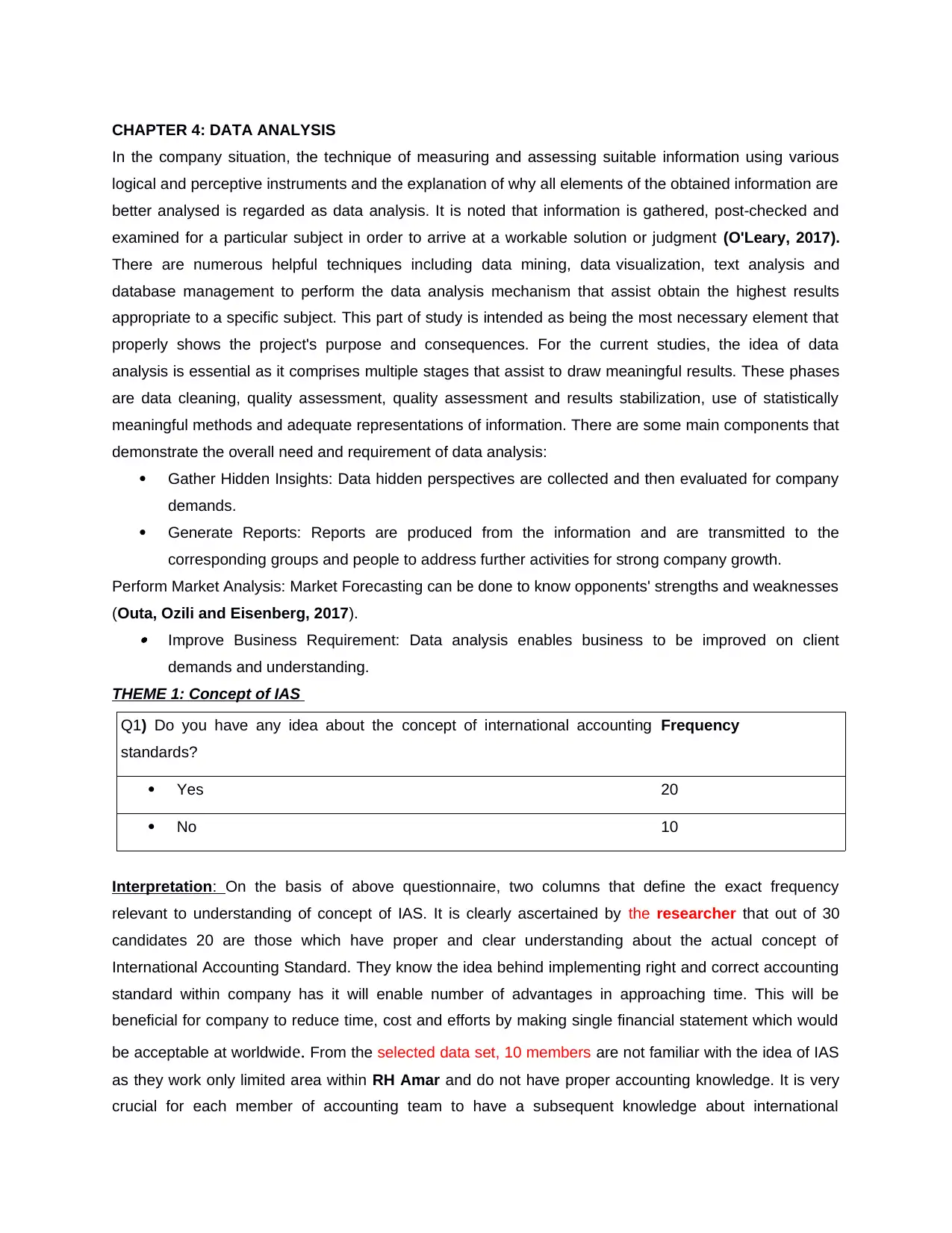
CHAPTER 4: DATA ANALYSIS
In the company situation, the technique of measuring and assessing suitable information using various
logical and perceptive instruments and the explanation of why all elements of the obtained information are
better analysed is regarded as data analysis. It is noted that information is gathered, post-checked and
examined for a particular subject in order to arrive at a workable solution or judgment (O'Leary, 2017).
There are numerous helpful techniques including data mining, data visualization, text analysis and
database management to perform the data analysis mechanism that assist obtain the highest results
appropriate to a specific subject. This part of study is intended as being the most necessary element that
properly shows the project's purpose and consequences. For the current studies, the idea of data
analysis is essential as it comprises multiple stages that assist to draw meaningful results. These phases
are data cleaning, quality assessment, quality assessment and results stabilization, use of statistically
meaningful methods and adequate representations of information. There are some main components that
demonstrate the overall need and requirement of data analysis:
Gather Hidden Insights: Data hidden perspectives are collected and then evaluated for company
demands.
Generate Reports: Reports are produced from the information and are transmitted to the
corresponding groups and people to address further activities for strong company growth.
Perform Market Analysis: Market Forecasting can be done to know opponents' strengths and weaknesses
(Outa, Ozili and Eisenberg, 2017).
Improve Business Requirement: Data analysis enables business to be improved on client
demands and understanding.
THEME 1: Concept of IAS
Q1) Do you have any idea about the concept of international accounting
standards?
Frequency
Yes 20
No 10
Interpretation: On the basis of above questionnaire, two columns that define the exact frequency
relevant to understanding of concept of IAS. It is clearly ascertained by the researcher that out of 30
candidates 20 are those which have proper and clear understanding about the actual concept of
International Accounting Standard. They know the idea behind implementing right and correct accounting
standard within company has it will enable number of advantages in approaching time. This will be
beneficial for company to reduce time, cost and efforts by making single financial statement which would
be acceptable at worldwide. From the selected data set, 10 members are not familiar with the idea of IAS
as they work only limited area within RH Amar and do not have proper accounting knowledge. It is very
crucial for each member of accounting team to have a subsequent knowledge about international
In the company situation, the technique of measuring and assessing suitable information using various
logical and perceptive instruments and the explanation of why all elements of the obtained information are
better analysed is regarded as data analysis. It is noted that information is gathered, post-checked and
examined for a particular subject in order to arrive at a workable solution or judgment (O'Leary, 2017).
There are numerous helpful techniques including data mining, data visualization, text analysis and
database management to perform the data analysis mechanism that assist obtain the highest results
appropriate to a specific subject. This part of study is intended as being the most necessary element that
properly shows the project's purpose and consequences. For the current studies, the idea of data
analysis is essential as it comprises multiple stages that assist to draw meaningful results. These phases
are data cleaning, quality assessment, quality assessment and results stabilization, use of statistically
meaningful methods and adequate representations of information. There are some main components that
demonstrate the overall need and requirement of data analysis:
Gather Hidden Insights: Data hidden perspectives are collected and then evaluated for company
demands.
Generate Reports: Reports are produced from the information and are transmitted to the
corresponding groups and people to address further activities for strong company growth.
Perform Market Analysis: Market Forecasting can be done to know opponents' strengths and weaknesses
(Outa, Ozili and Eisenberg, 2017).
Improve Business Requirement: Data analysis enables business to be improved on client
demands and understanding.
THEME 1: Concept of IAS
Q1) Do you have any idea about the concept of international accounting
standards?
Frequency
Yes 20
No 10
Interpretation: On the basis of above questionnaire, two columns that define the exact frequency
relevant to understanding of concept of IAS. It is clearly ascertained by the researcher that out of 30
candidates 20 are those which have proper and clear understanding about the actual concept of
International Accounting Standard. They know the idea behind implementing right and correct accounting
standard within company has it will enable number of advantages in approaching time. This will be
beneficial for company to reduce time, cost and efforts by making single financial statement which would
be acceptable at worldwide. From the selected data set, 10 members are not familiar with the idea of IAS
as they work only limited area within RH Amar and do not have proper accounting knowledge. It is very
crucial for each member of accounting team to have a subsequent knowledge about international
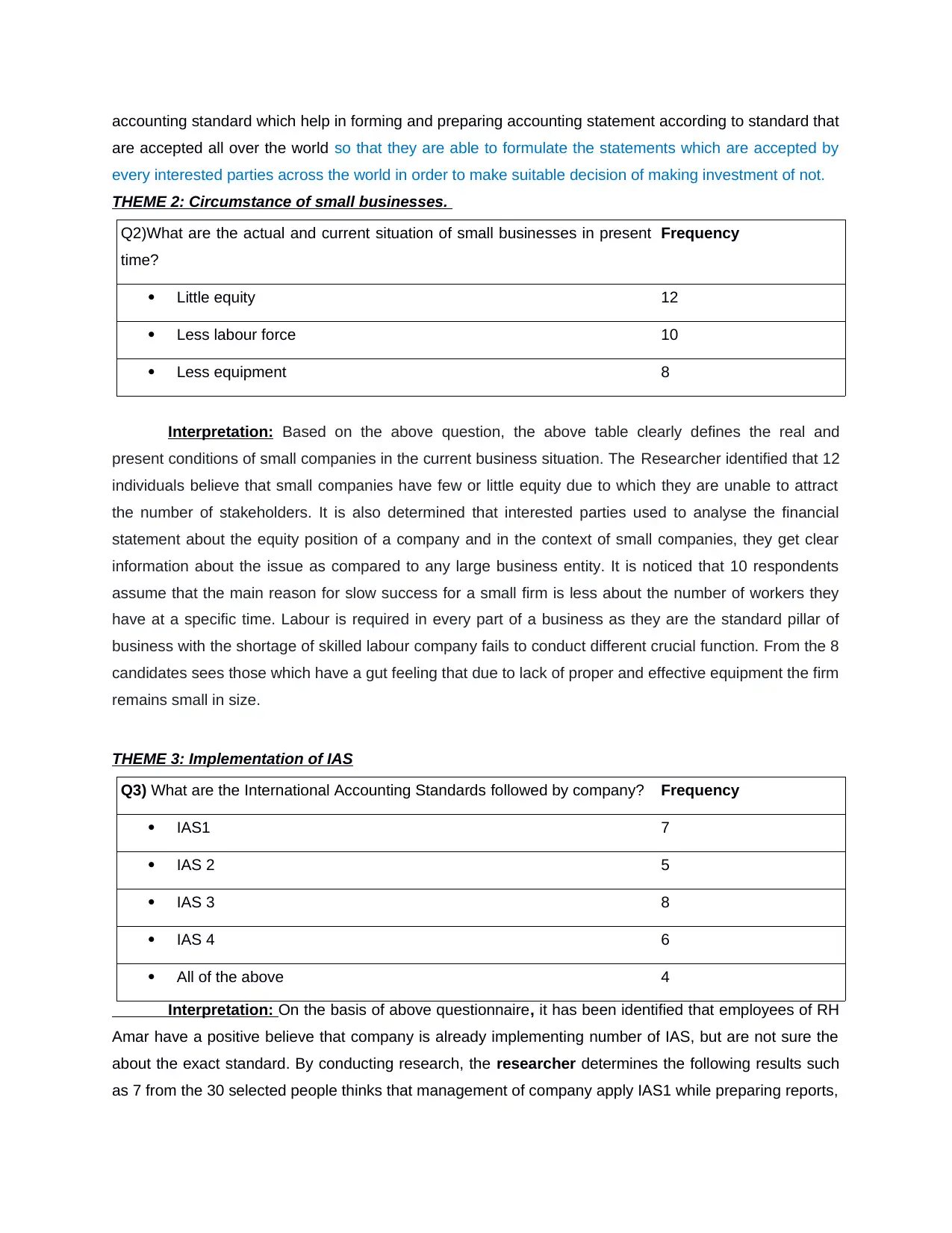
accounting standard which help in forming and preparing accounting statement according to standard that
are accepted all over the world so that they are able to formulate the statements which are accepted by
every interested parties across the world in order to make suitable decision of making investment of not.
THEME 2: Circumstance of small businesses.
Q2)What are the actual and current situation of small businesses in present
time?
Frequency
Little equity 12
Less labour force 10
Less equipment 8
Interpretation: Based on the above question, the above table clearly defines the real and
present conditions of small companies in the current business situation. The Researcher identified that 12
individuals believe that small companies have few or little equity due to which they are unable to attract
the number of stakeholders. It is also determined that interested parties used to analyse the financial
statement about the equity position of a company and in the context of small companies, they get clear
information about the issue as compared to any large business entity. It is noticed that 10 respondents
assume that the main reason for slow success for a small firm is less about the number of workers they
have at a specific time. Labour is required in every part of a business as they are the standard pillar of
business with the shortage of skilled labour company fails to conduct different crucial function. From the 8
candidates sees those which have a gut feeling that due to lack of proper and effective equipment the firm
remains small in size.
THEME 3: Implementation of IAS
Q3) What are the International Accounting Standards followed by company? Frequency
IAS1 7
IAS 2 5
IAS 3 8
IAS 4 6
All of the above 4
Interpretation: On the basis of above questionnaire, it has been identified that employees of RH
Amar have a positive believe that company is already implementing number of IAS, but are not sure the
about the exact standard. By conducting research, the researcher determines the following results such
as 7 from the 30 selected people thinks that management of company apply IAS1 while preparing reports,
are accepted all over the world so that they are able to formulate the statements which are accepted by
every interested parties across the world in order to make suitable decision of making investment of not.
THEME 2: Circumstance of small businesses.
Q2)What are the actual and current situation of small businesses in present
time?
Frequency
Little equity 12
Less labour force 10
Less equipment 8
Interpretation: Based on the above question, the above table clearly defines the real and
present conditions of small companies in the current business situation. The Researcher identified that 12
individuals believe that small companies have few or little equity due to which they are unable to attract
the number of stakeholders. It is also determined that interested parties used to analyse the financial
statement about the equity position of a company and in the context of small companies, they get clear
information about the issue as compared to any large business entity. It is noticed that 10 respondents
assume that the main reason for slow success for a small firm is less about the number of workers they
have at a specific time. Labour is required in every part of a business as they are the standard pillar of
business with the shortage of skilled labour company fails to conduct different crucial function. From the 8
candidates sees those which have a gut feeling that due to lack of proper and effective equipment the firm
remains small in size.
THEME 3: Implementation of IAS
Q3) What are the International Accounting Standards followed by company? Frequency
IAS1 7
IAS 2 5
IAS 3 8
IAS 4 6
All of the above 4
Interpretation: On the basis of above questionnaire, it has been identified that employees of RH
Amar have a positive believe that company is already implementing number of IAS, but are not sure the
about the exact standard. By conducting research, the researcher determines the following results such
as 7 from the 30 selected people thinks that management of company apply IAS1 while preparing reports,
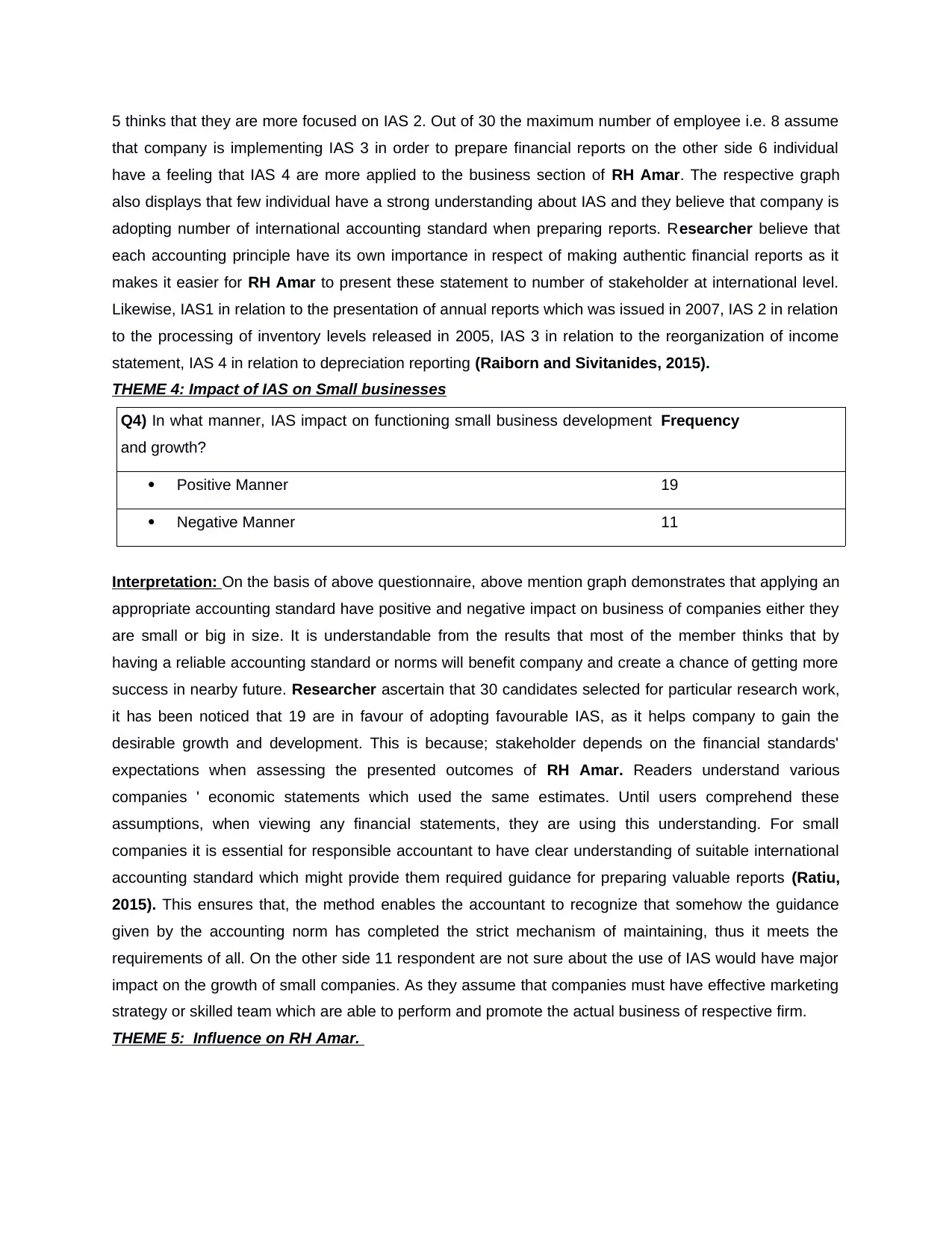
5 thinks that they are more focused on IAS 2. Out of 30 the maximum number of employee i.e. 8 assume
that company is implementing IAS 3 in order to prepare financial reports on the other side 6 individual
have a feeling that IAS 4 are more applied to the business section of RH Amar. The respective graph
also displays that few individual have a strong understanding about IAS and they believe that company is
adopting number of international accounting standard when preparing reports. Researcher believe that
each accounting principle have its own importance in respect of making authentic financial reports as it
makes it easier for RH Amar to present these statement to number of stakeholder at international level.
Likewise, IAS1 in relation to the presentation of annual reports which was issued in 2007, IAS 2 in relation
to the processing of inventory levels released in 2005, IAS 3 in relation to the reorganization of income
statement, IAS 4 in relation to depreciation reporting (Raiborn and Sivitanides, 2015).
THEME 4: Impact of IAS on Small businesses
Q4) In what manner, IAS impact on functioning small business development
and growth?
Frequency
Positive Manner 19
Negative Manner 11
Interpretation: On the basis of above questionnaire, above mention graph demonstrates that applying an
appropriate accounting standard have positive and negative impact on business of companies either they
are small or big in size. It is understandable from the results that most of the member thinks that by
having a reliable accounting standard or norms will benefit company and create a chance of getting more
success in nearby future. Researcher ascertain that 30 candidates selected for particular research work,
it has been noticed that 19 are in favour of adopting favourable IAS, as it helps company to gain the
desirable growth and development. This is because; stakeholder depends on the financial standards'
expectations when assessing the presented outcomes of RH Amar. Readers understand various
companies ' economic statements which used the same estimates. Until users comprehend these
assumptions, when viewing any financial statements, they are using this understanding. For small
companies it is essential for responsible accountant to have clear understanding of suitable international
accounting standard which might provide them required guidance for preparing valuable reports (Ratiu,
2015). This ensures that, the method enables the accountant to recognize that somehow the guidance
given by the accounting norm has completed the strict mechanism of maintaining, thus it meets the
requirements of all. On the other side 11 respondent are not sure about the use of IAS would have major
impact on the growth of small companies. As they assume that companies must have effective marketing
strategy or skilled team which are able to perform and promote the actual business of respective firm.
THEME 5: Influence on RH Amar.
that company is implementing IAS 3 in order to prepare financial reports on the other side 6 individual
have a feeling that IAS 4 are more applied to the business section of RH Amar. The respective graph
also displays that few individual have a strong understanding about IAS and they believe that company is
adopting number of international accounting standard when preparing reports. Researcher believe that
each accounting principle have its own importance in respect of making authentic financial reports as it
makes it easier for RH Amar to present these statement to number of stakeholder at international level.
Likewise, IAS1 in relation to the presentation of annual reports which was issued in 2007, IAS 2 in relation
to the processing of inventory levels released in 2005, IAS 3 in relation to the reorganization of income
statement, IAS 4 in relation to depreciation reporting (Raiborn and Sivitanides, 2015).
THEME 4: Impact of IAS on Small businesses
Q4) In what manner, IAS impact on functioning small business development
and growth?
Frequency
Positive Manner 19
Negative Manner 11
Interpretation: On the basis of above questionnaire, above mention graph demonstrates that applying an
appropriate accounting standard have positive and negative impact on business of companies either they
are small or big in size. It is understandable from the results that most of the member thinks that by
having a reliable accounting standard or norms will benefit company and create a chance of getting more
success in nearby future. Researcher ascertain that 30 candidates selected for particular research work,
it has been noticed that 19 are in favour of adopting favourable IAS, as it helps company to gain the
desirable growth and development. This is because; stakeholder depends on the financial standards'
expectations when assessing the presented outcomes of RH Amar. Readers understand various
companies ' economic statements which used the same estimates. Until users comprehend these
assumptions, when viewing any financial statements, they are using this understanding. For small
companies it is essential for responsible accountant to have clear understanding of suitable international
accounting standard which might provide them required guidance for preparing valuable reports (Ratiu,
2015). This ensures that, the method enables the accountant to recognize that somehow the guidance
given by the accounting norm has completed the strict mechanism of maintaining, thus it meets the
requirements of all. On the other side 11 respondent are not sure about the use of IAS would have major
impact on the growth of small companies. As they assume that companies must have effective marketing
strategy or skilled team which are able to perform and promote the actual business of respective firm.
THEME 5: Influence on RH Amar.
Paraphrase This Document
Need a fresh take? Get an instant paraphrase of this document with our AI Paraphraser
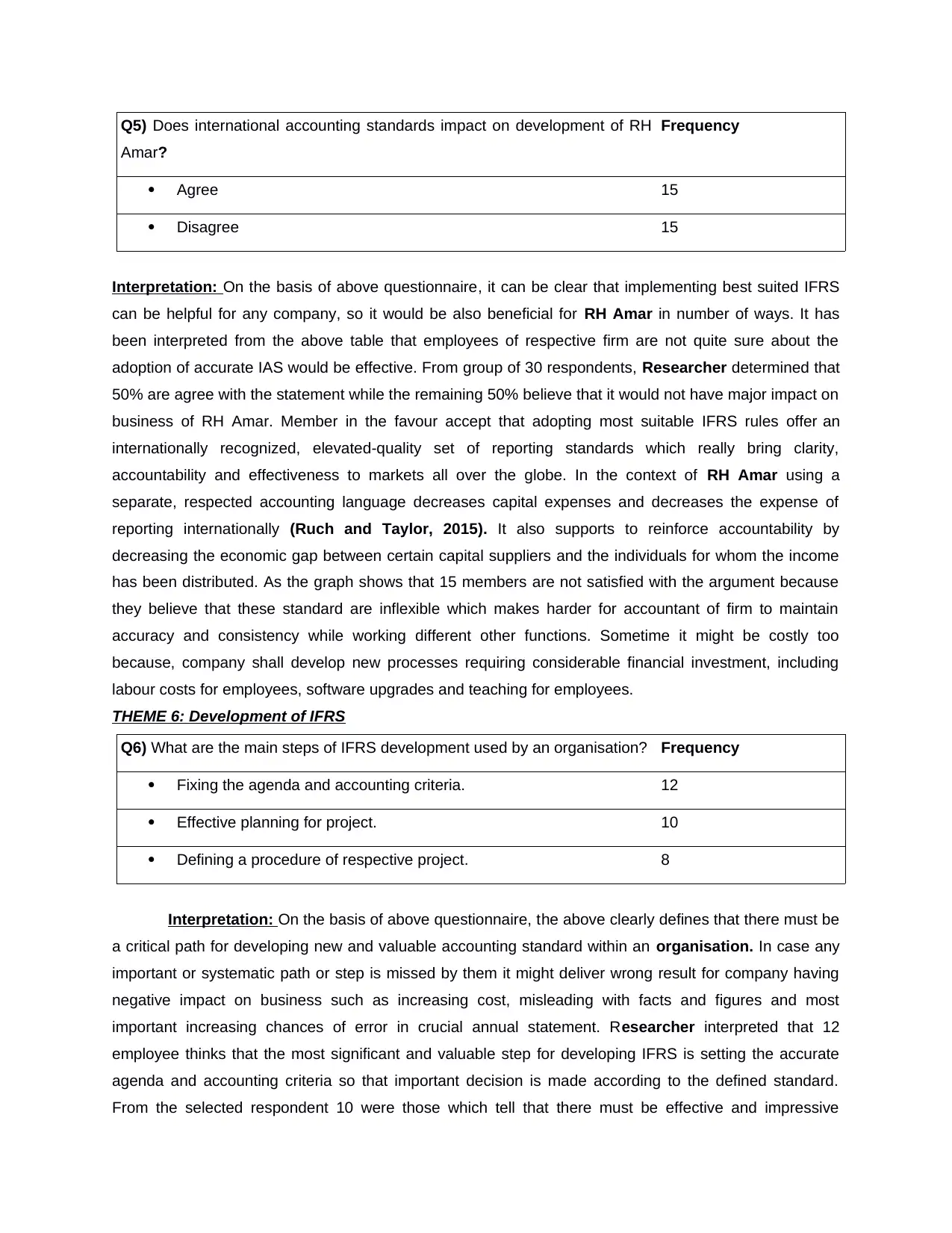
Q5) Does international accounting standards impact on development of RH
Amar?
Frequency
Agree 15
Disagree 15
Interpretation: On the basis of above questionnaire, it can be clear that implementing best suited IFRS
can be helpful for any company, so it would be also beneficial for RH Amar in number of ways. It has
been interpreted from the above table that employees of respective firm are not quite sure about the
adoption of accurate IAS would be effective. From group of 30 respondents, Researcher determined that
50% are agree with the statement while the remaining 50% believe that it would not have major impact on
business of RH Amar. Member in the favour accept that adopting most suitable IFRS rules offer an
internationally recognized, elevated-quality set of reporting standards which really bring clarity,
accountability and effectiveness to markets all over the globe. In the context of RH Amar using a
separate, respected accounting language decreases capital expenses and decreases the expense of
reporting internationally (Ruch and Taylor, 2015). It also supports to reinforce accountability by
decreasing the economic gap between certain capital suppliers and the individuals for whom the income
has been distributed. As the graph shows that 15 members are not satisfied with the argument because
they believe that these standard are inflexible which makes harder for accountant of firm to maintain
accuracy and consistency while working different other functions. Sometime it might be costly too
because, company shall develop new processes requiring considerable financial investment, including
labour costs for employees, software upgrades and teaching for employees.
THEME 6: Development of IFRS
Q6) What are the main steps of IFRS development used by an organisation? Frequency
Fixing the agenda and accounting criteria. 12
Effective planning for project. 10
Defining a procedure of respective project. 8
Interpretation: On the basis of above questionnaire, the above clearly defines that there must be
a critical path for developing new and valuable accounting standard within an organisation. In case any
important or systematic path or step is missed by them it might deliver wrong result for company having
negative impact on business such as increasing cost, misleading with facts and figures and most
important increasing chances of error in crucial annual statement. Researcher interpreted that 12
employee thinks that the most significant and valuable step for developing IFRS is setting the accurate
agenda and accounting criteria so that important decision is made according to the defined standard.
From the selected respondent 10 were those which tell that there must be effective and impressive
Amar?
Frequency
Agree 15
Disagree 15
Interpretation: On the basis of above questionnaire, it can be clear that implementing best suited IFRS
can be helpful for any company, so it would be also beneficial for RH Amar in number of ways. It has
been interpreted from the above table that employees of respective firm are not quite sure about the
adoption of accurate IAS would be effective. From group of 30 respondents, Researcher determined that
50% are agree with the statement while the remaining 50% believe that it would not have major impact on
business of RH Amar. Member in the favour accept that adopting most suitable IFRS rules offer an
internationally recognized, elevated-quality set of reporting standards which really bring clarity,
accountability and effectiveness to markets all over the globe. In the context of RH Amar using a
separate, respected accounting language decreases capital expenses and decreases the expense of
reporting internationally (Ruch and Taylor, 2015). It also supports to reinforce accountability by
decreasing the economic gap between certain capital suppliers and the individuals for whom the income
has been distributed. As the graph shows that 15 members are not satisfied with the argument because
they believe that these standard are inflexible which makes harder for accountant of firm to maintain
accuracy and consistency while working different other functions. Sometime it might be costly too
because, company shall develop new processes requiring considerable financial investment, including
labour costs for employees, software upgrades and teaching for employees.
THEME 6: Development of IFRS
Q6) What are the main steps of IFRS development used by an organisation? Frequency
Fixing the agenda and accounting criteria. 12
Effective planning for project. 10
Defining a procedure of respective project. 8
Interpretation: On the basis of above questionnaire, the above clearly defines that there must be
a critical path for developing new and valuable accounting standard within an organisation. In case any
important or systematic path or step is missed by them it might deliver wrong result for company having
negative impact on business such as increasing cost, misleading with facts and figures and most
important increasing chances of error in crucial annual statement. Researcher interpreted that 12
employee thinks that the most significant and valuable step for developing IFRS is setting the accurate
agenda and accounting criteria so that important decision is made according to the defined standard.
From the selected respondent 10 were those which tell that there must be effective and impressive
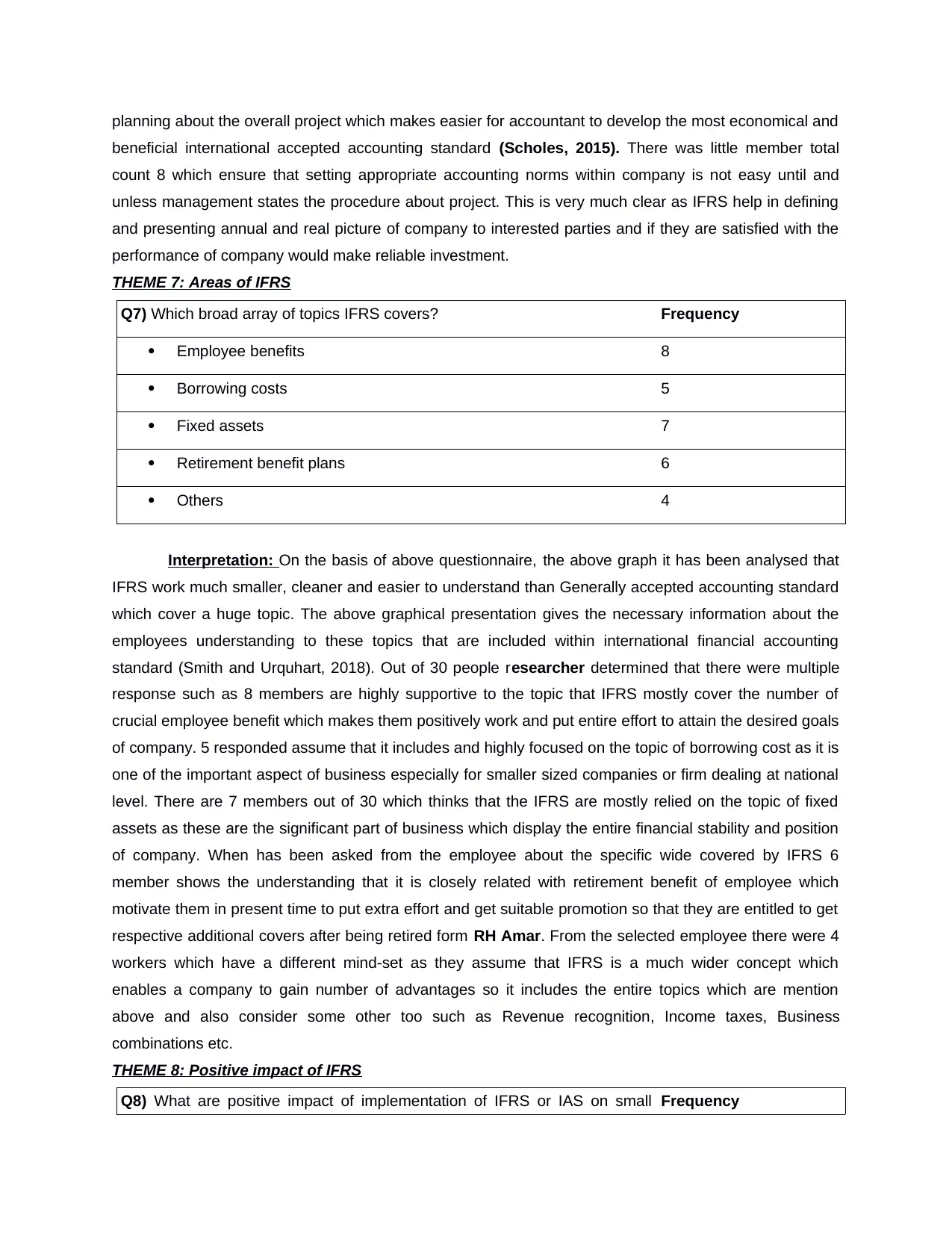
planning about the overall project which makes easier for accountant to develop the most economical and
beneficial international accepted accounting standard (Scholes, 2015). There was little member total
count 8 which ensure that setting appropriate accounting norms within company is not easy until and
unless management states the procedure about project. This is very much clear as IFRS help in defining
and presenting annual and real picture of company to interested parties and if they are satisfied with the
performance of company would make reliable investment.
THEME 7: Areas of IFRS
Q7) Which broad array of topics IFRS covers? Frequency
Employee benefits 8
Borrowing costs 5
Fixed assets 7
Retirement benefit plans 6
Others 4
Interpretation: On the basis of above questionnaire, the above graph it has been analysed that
IFRS work much smaller, cleaner and easier to understand than Generally accepted accounting standard
which cover a huge topic. The above graphical presentation gives the necessary information about the
employees understanding to these topics that are included within international financial accounting
standard (Smith and Urquhart, 2018). Out of 30 people researcher determined that there were multiple
response such as 8 members are highly supportive to the topic that IFRS mostly cover the number of
crucial employee benefit which makes them positively work and put entire effort to attain the desired goals
of company. 5 responded assume that it includes and highly focused on the topic of borrowing cost as it is
one of the important aspect of business especially for smaller sized companies or firm dealing at national
level. There are 7 members out of 30 which thinks that the IFRS are mostly relied on the topic of fixed
assets as these are the significant part of business which display the entire financial stability and position
of company. When has been asked from the employee about the specific wide covered by IFRS 6
member shows the understanding that it is closely related with retirement benefit of employee which
motivate them in present time to put extra effort and get suitable promotion so that they are entitled to get
respective additional covers after being retired form RH Amar. From the selected employee there were 4
workers which have a different mind-set as they assume that IFRS is a much wider concept which
enables a company to gain number of advantages so it includes the entire topics which are mention
above and also consider some other too such as Revenue recognition, Income taxes, Business
combinations etc.
THEME 8: Positive impact of IFRS
Q8) What are positive impact of implementation of IFRS or IAS on small Frequency
beneficial international accepted accounting standard (Scholes, 2015). There was little member total
count 8 which ensure that setting appropriate accounting norms within company is not easy until and
unless management states the procedure about project. This is very much clear as IFRS help in defining
and presenting annual and real picture of company to interested parties and if they are satisfied with the
performance of company would make reliable investment.
THEME 7: Areas of IFRS
Q7) Which broad array of topics IFRS covers? Frequency
Employee benefits 8
Borrowing costs 5
Fixed assets 7
Retirement benefit plans 6
Others 4
Interpretation: On the basis of above questionnaire, the above graph it has been analysed that
IFRS work much smaller, cleaner and easier to understand than Generally accepted accounting standard
which cover a huge topic. The above graphical presentation gives the necessary information about the
employees understanding to these topics that are included within international financial accounting
standard (Smith and Urquhart, 2018). Out of 30 people researcher determined that there were multiple
response such as 8 members are highly supportive to the topic that IFRS mostly cover the number of
crucial employee benefit which makes them positively work and put entire effort to attain the desired goals
of company. 5 responded assume that it includes and highly focused on the topic of borrowing cost as it is
one of the important aspect of business especially for smaller sized companies or firm dealing at national
level. There are 7 members out of 30 which thinks that the IFRS are mostly relied on the topic of fixed
assets as these are the significant part of business which display the entire financial stability and position
of company. When has been asked from the employee about the specific wide covered by IFRS 6
member shows the understanding that it is closely related with retirement benefit of employee which
motivate them in present time to put extra effort and get suitable promotion so that they are entitled to get
respective additional covers after being retired form RH Amar. From the selected employee there were 4
workers which have a different mind-set as they assume that IFRS is a much wider concept which
enables a company to gain number of advantages so it includes the entire topics which are mention
above and also consider some other too such as Revenue recognition, Income taxes, Business
combinations etc.
THEME 8: Positive impact of IFRS
Q8) What are positive impact of implementation of IFRS or IAS on small Frequency
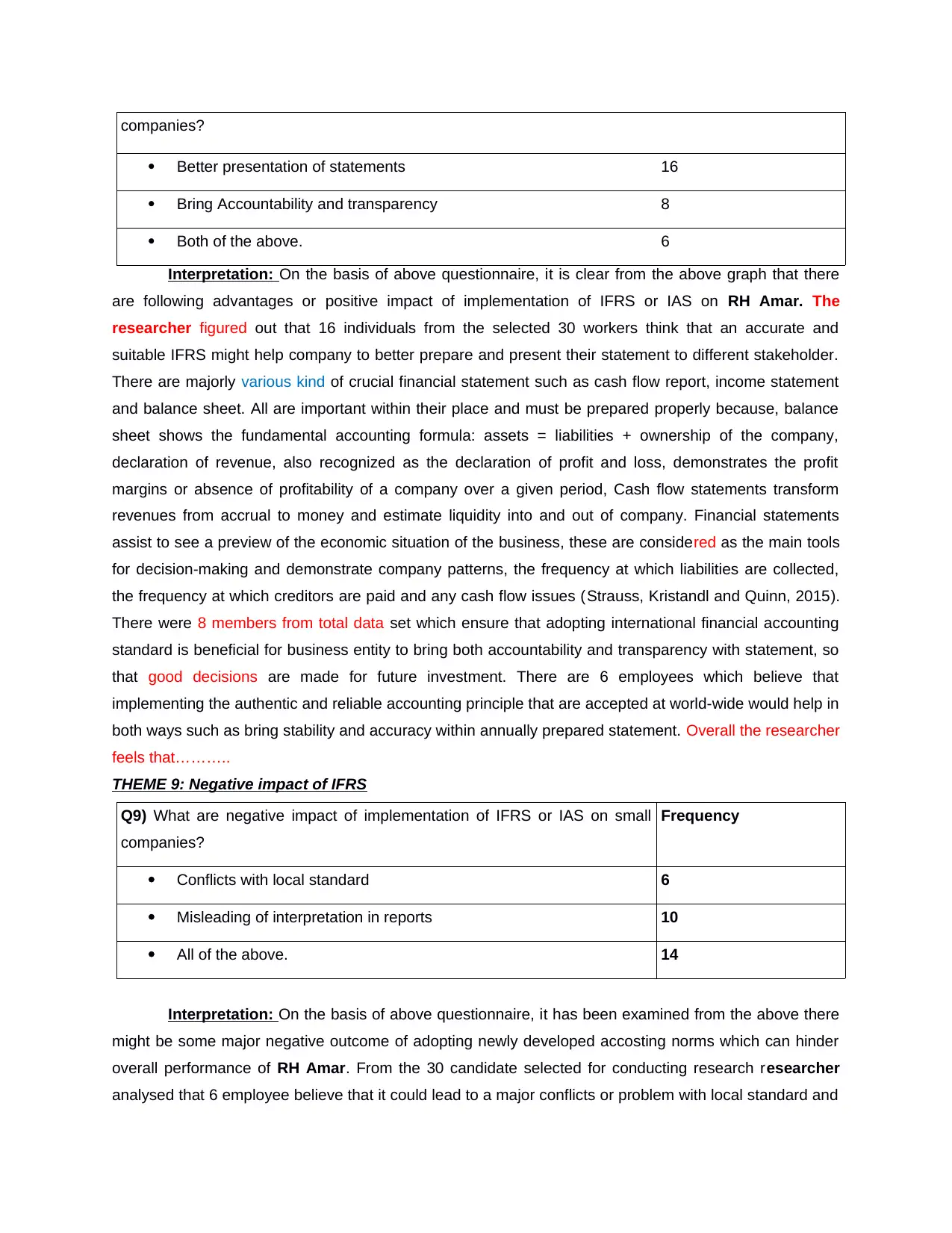
companies?
Better presentation of statements 16
Bring Accountability and transparency 8
Both of the above. 6
Interpretation: On the basis of above questionnaire, it is clear from the above graph that there
are following advantages or positive impact of implementation of IFRS or IAS on RH Amar. The
researcher figured out that 16 individuals from the selected 30 workers think that an accurate and
suitable IFRS might help company to better prepare and present their statement to different stakeholder.
There are majorly various kind of crucial financial statement such as cash flow report, income statement
and balance sheet. All are important within their place and must be prepared properly because, balance
sheet shows the fundamental accounting formula: assets = liabilities + ownership of the company,
declaration of revenue, also recognized as the declaration of profit and loss, demonstrates the profit
margins or absence of profitability of a company over a given period, Cash flow statements transform
revenues from accrual to money and estimate liquidity into and out of company. Financial statements
assist to see a preview of the economic situation of the business, these are considered as the main tools
for decision-making and demonstrate company patterns, the frequency at which liabilities are collected,
the frequency at which creditors are paid and any cash flow issues (Strauss, Kristandl and Quinn, 2015).
There were 8 members from total data set which ensure that adopting international financial accounting
standard is beneficial for business entity to bring both accountability and transparency with statement, so
that good decisions are made for future investment. There are 6 employees which believe that
implementing the authentic and reliable accounting principle that are accepted at world-wide would help in
both ways such as bring stability and accuracy within annually prepared statement. Overall the researcher
feels that………..
THEME 9: Negative impact of IFRS
Q9) What are negative impact of implementation of IFRS or IAS on small
companies?
Frequency
Conflicts with local standard 6
Misleading of interpretation in reports 10
All of the above. 14
Interpretation: On the basis of above questionnaire, it has been examined from the above there
might be some major negative outcome of adopting newly developed accosting norms which can hinder
overall performance of RH Amar. From the 30 candidate selected for conducting research researcher
analysed that 6 employee believe that it could lead to a major conflicts or problem with local standard and
Better presentation of statements 16
Bring Accountability and transparency 8
Both of the above. 6
Interpretation: On the basis of above questionnaire, it is clear from the above graph that there
are following advantages or positive impact of implementation of IFRS or IAS on RH Amar. The
researcher figured out that 16 individuals from the selected 30 workers think that an accurate and
suitable IFRS might help company to better prepare and present their statement to different stakeholder.
There are majorly various kind of crucial financial statement such as cash flow report, income statement
and balance sheet. All are important within their place and must be prepared properly because, balance
sheet shows the fundamental accounting formula: assets = liabilities + ownership of the company,
declaration of revenue, also recognized as the declaration of profit and loss, demonstrates the profit
margins or absence of profitability of a company over a given period, Cash flow statements transform
revenues from accrual to money and estimate liquidity into and out of company. Financial statements
assist to see a preview of the economic situation of the business, these are considered as the main tools
for decision-making and demonstrate company patterns, the frequency at which liabilities are collected,
the frequency at which creditors are paid and any cash flow issues (Strauss, Kristandl and Quinn, 2015).
There were 8 members from total data set which ensure that adopting international financial accounting
standard is beneficial for business entity to bring both accountability and transparency with statement, so
that good decisions are made for future investment. There are 6 employees which believe that
implementing the authentic and reliable accounting principle that are accepted at world-wide would help in
both ways such as bring stability and accuracy within annually prepared statement. Overall the researcher
feels that………..
THEME 9: Negative impact of IFRS
Q9) What are negative impact of implementation of IFRS or IAS on small
companies?
Frequency
Conflicts with local standard 6
Misleading of interpretation in reports 10
All of the above. 14
Interpretation: On the basis of above questionnaire, it has been examined from the above there
might be some major negative outcome of adopting newly developed accosting norms which can hinder
overall performance of RH Amar. From the 30 candidate selected for conducting research researcher
analysed that 6 employee believe that it could lead to a major conflicts or problem with local standard and
Secure Best Marks with AI Grader
Need help grading? Try our AI Grader for instant feedback on your assignments.
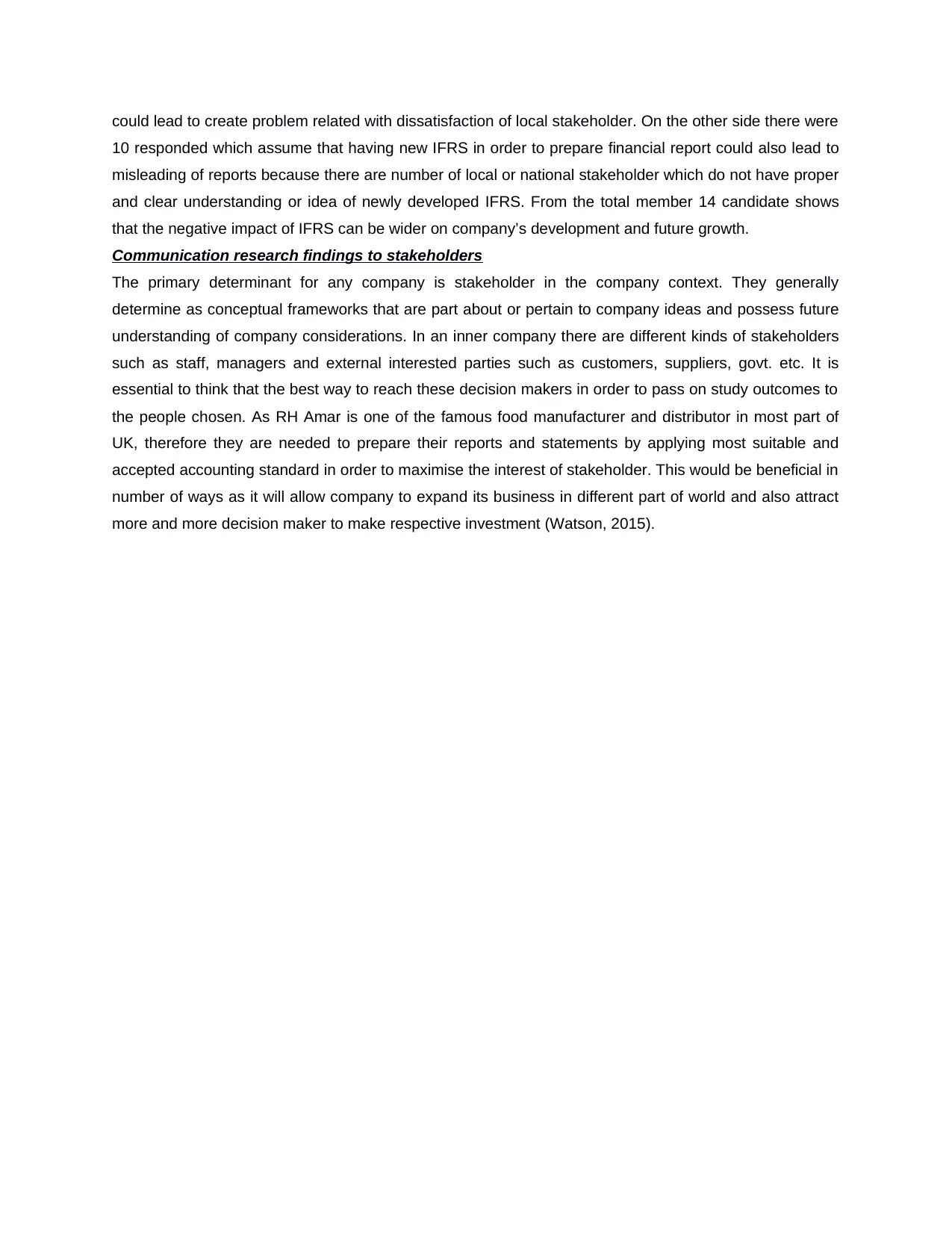
could lead to create problem related with dissatisfaction of local stakeholder. On the other side there were
10 responded which assume that having new IFRS in order to prepare financial report could also lead to
misleading of reports because there are number of local or national stakeholder which do not have proper
and clear understanding or idea of newly developed IFRS. From the total member 14 candidate shows
that the negative impact of IFRS can be wider on company’s development and future growth.
Communication research findings to stakeholders
The primary determinant for any company is stakeholder in the company context. They generally
determine as conceptual frameworks that are part about or pertain to company ideas and possess future
understanding of company considerations. In an inner company there are different kinds of stakeholders
such as staff, managers and external interested parties such as customers, suppliers, govt. etc. It is
essential to think that the best way to reach these decision makers in order to pass on study outcomes to
the people chosen. As RH Amar is one of the famous food manufacturer and distributor in most part of
UK, therefore they are needed to prepare their reports and statements by applying most suitable and
accepted accounting standard in order to maximise the interest of stakeholder. This would be beneficial in
number of ways as it will allow company to expand its business in different part of world and also attract
more and more decision maker to make respective investment (Watson, 2015).
10 responded which assume that having new IFRS in order to prepare financial report could also lead to
misleading of reports because there are number of local or national stakeholder which do not have proper
and clear understanding or idea of newly developed IFRS. From the total member 14 candidate shows
that the negative impact of IFRS can be wider on company’s development and future growth.
Communication research findings to stakeholders
The primary determinant for any company is stakeholder in the company context. They generally
determine as conceptual frameworks that are part about or pertain to company ideas and possess future
understanding of company considerations. In an inner company there are different kinds of stakeholders
such as staff, managers and external interested parties such as customers, suppliers, govt. etc. It is
essential to think that the best way to reach these decision makers in order to pass on study outcomes to
the people chosen. As RH Amar is one of the famous food manufacturer and distributor in most part of
UK, therefore they are needed to prepare their reports and statements by applying most suitable and
accepted accounting standard in order to maximise the interest of stakeholder. This would be beneficial in
number of ways as it will allow company to expand its business in different part of world and also attract
more and more decision maker to make respective investment (Watson, 2015).
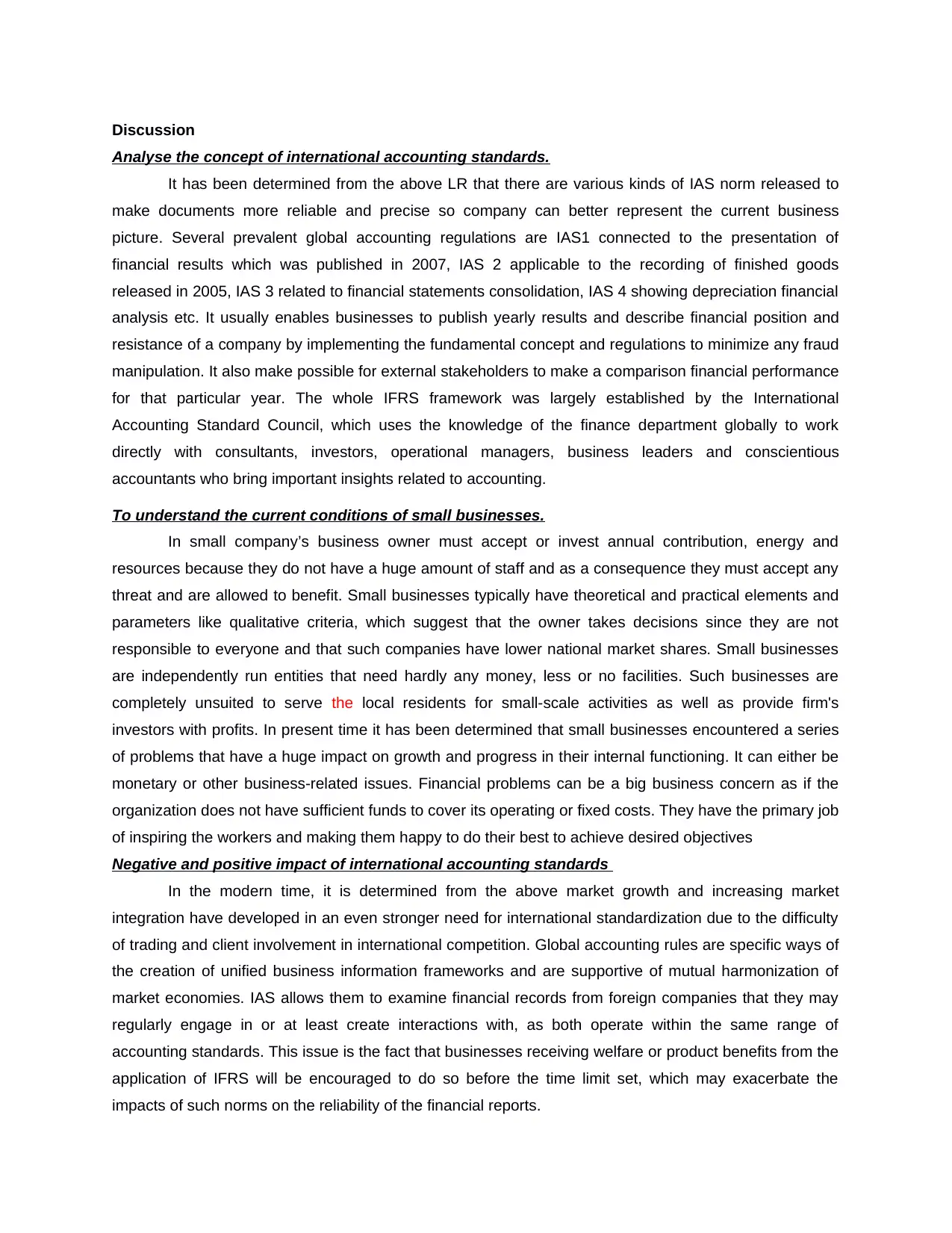
Discussion
Analyse the concept of international accounting standards.
It has been determined from the above LR that there are various kinds of IAS norm released to
make documents more reliable and precise so company can better represent the current business
picture. Several prevalent global accounting regulations are IAS1 connected to the presentation of
financial results which was published in 2007, IAS 2 applicable to the recording of finished goods
released in 2005, IAS 3 related to financial statements consolidation, IAS 4 showing depreciation financial
analysis etc. It usually enables businesses to publish yearly results and describe financial position and
resistance of a company by implementing the fundamental concept and regulations to minimize any fraud
manipulation. It also make possible for external stakeholders to make a comparison financial performance
for that particular year. The whole IFRS framework was largely established by the International
Accounting Standard Council, which uses the knowledge of the finance department globally to work
directly with consultants, investors, operational managers, business leaders and conscientious
accountants who bring important insights related to accounting.
To understand the current conditions of small businesses.
In small company’s business owner must accept or invest annual contribution, energy and
resources because they do not have a huge amount of staff and as a consequence they must accept any
threat and are allowed to benefit. Small businesses typically have theoretical and practical elements and
parameters like qualitative criteria, which suggest that the owner takes decisions since they are not
responsible to everyone and that such companies have lower national market shares. Small businesses
are independently run entities that need hardly any money, less or no facilities. Such businesses are
completely unsuited to serve the local residents for small-scale activities as well as provide firm's
investors with profits. In present time it has been determined that small businesses encountered a series
of problems that have a huge impact on growth and progress in their internal functioning. It can either be
monetary or other business-related issues. Financial problems can be a big business concern as if the
organization does not have sufficient funds to cover its operating or fixed costs. They have the primary job
of inspiring the workers and making them happy to do their best to achieve desired objectives
Negative and positive impact of international accounting standards
In the modern time, it is determined from the above market growth and increasing market
integration have developed in an even stronger need for international standardization due to the difficulty
of trading and client involvement in international competition. Global accounting rules are specific ways of
the creation of unified business information frameworks and are supportive of mutual harmonization of
market economies. IAS allows them to examine financial records from foreign companies that they may
regularly engage in or at least create interactions with, as both operate within the same range of
accounting standards. This issue is the fact that businesses receiving welfare or product benefits from the
application of IFRS will be encouraged to do so before the time limit set, which may exacerbate the
impacts of such norms on the reliability of the financial reports.
Analyse the concept of international accounting standards.
It has been determined from the above LR that there are various kinds of IAS norm released to
make documents more reliable and precise so company can better represent the current business
picture. Several prevalent global accounting regulations are IAS1 connected to the presentation of
financial results which was published in 2007, IAS 2 applicable to the recording of finished goods
released in 2005, IAS 3 related to financial statements consolidation, IAS 4 showing depreciation financial
analysis etc. It usually enables businesses to publish yearly results and describe financial position and
resistance of a company by implementing the fundamental concept and regulations to minimize any fraud
manipulation. It also make possible for external stakeholders to make a comparison financial performance
for that particular year. The whole IFRS framework was largely established by the International
Accounting Standard Council, which uses the knowledge of the finance department globally to work
directly with consultants, investors, operational managers, business leaders and conscientious
accountants who bring important insights related to accounting.
To understand the current conditions of small businesses.
In small company’s business owner must accept or invest annual contribution, energy and
resources because they do not have a huge amount of staff and as a consequence they must accept any
threat and are allowed to benefit. Small businesses typically have theoretical and practical elements and
parameters like qualitative criteria, which suggest that the owner takes decisions since they are not
responsible to everyone and that such companies have lower national market shares. Small businesses
are independently run entities that need hardly any money, less or no facilities. Such businesses are
completely unsuited to serve the local residents for small-scale activities as well as provide firm's
investors with profits. In present time it has been determined that small businesses encountered a series
of problems that have a huge impact on growth and progress in their internal functioning. It can either be
monetary or other business-related issues. Financial problems can be a big business concern as if the
organization does not have sufficient funds to cover its operating or fixed costs. They have the primary job
of inspiring the workers and making them happy to do their best to achieve desired objectives
Negative and positive impact of international accounting standards
In the modern time, it is determined from the above market growth and increasing market
integration have developed in an even stronger need for international standardization due to the difficulty
of trading and client involvement in international competition. Global accounting rules are specific ways of
the creation of unified business information frameworks and are supportive of mutual harmonization of
market economies. IAS allows them to examine financial records from foreign companies that they may
regularly engage in or at least create interactions with, as both operate within the same range of
accounting standards. This issue is the fact that businesses receiving welfare or product benefits from the
application of IFRS will be encouraged to do so before the time limit set, which may exacerbate the
impacts of such norms on the reliability of the financial reports.
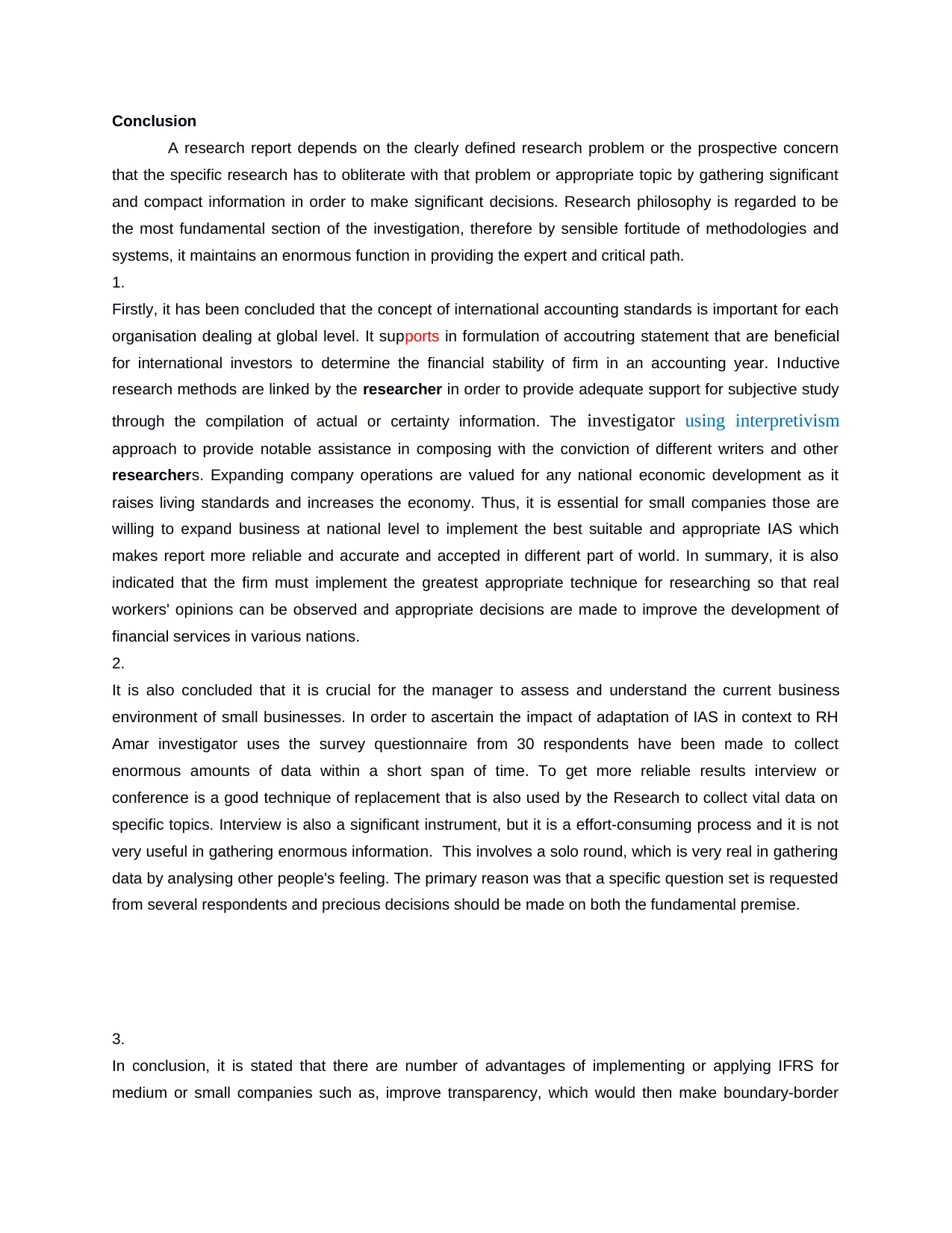
Conclusion
A research report depends on the clearly defined research problem or the prospective concern
that the specific research has to obliterate with that problem or appropriate topic by gathering significant
and compact information in order to make significant decisions. Research philosophy is regarded to be
the most fundamental section of the investigation, therefore by sensible fortitude of methodologies and
systems, it maintains an enormous function in providing the expert and critical path.
1.
Firstly, it has been concluded that the concept of international accounting standards is important for each
organisation dealing at global level. It supports in formulation of accoutring statement that are beneficial
for international investors to determine the financial stability of firm in an accounting year. Inductive
research methods are linked by the researcher in order to provide adequate support for subjective study
through the compilation of actual or certainty information. The investigator using interpretivism
approach to provide notable assistance in composing with the conviction of different writers and other
researchers. Expanding company operations are valued for any national economic development as it
raises living standards and increases the economy. Thus, it is essential for small companies those are
willing to expand business at national level to implement the best suitable and appropriate IAS which
makes report more reliable and accurate and accepted in different part of world. In summary, it is also
indicated that the firm must implement the greatest appropriate technique for researching so that real
workers' opinions can be observed and appropriate decisions are made to improve the development of
financial services in various nations.
2.
It is also concluded that it is crucial for the manager to assess and understand the current business
environment of small businesses. In order to ascertain the impact of adaptation of IAS in context to RH
Amar investigator uses the survey questionnaire from 30 respondents have been made to collect
enormous amounts of data within a short span of time. To get more reliable results interview or
conference is a good technique of replacement that is also used by the Research to collect vital data on
specific topics. Interview is also a significant instrument, but it is a effort-consuming process and it is not
very useful in gathering enormous information. This involves a solo round, which is very real in gathering
data by analysing other people's feeling. The primary reason was that a specific question set is requested
from several respondents and precious decisions should be made on both the fundamental premise.
3.
In conclusion, it is stated that there are number of advantages of implementing or applying IFRS for
medium or small companies such as, improve transparency, which would then make boundary-border
A research report depends on the clearly defined research problem or the prospective concern
that the specific research has to obliterate with that problem or appropriate topic by gathering significant
and compact information in order to make significant decisions. Research philosophy is regarded to be
the most fundamental section of the investigation, therefore by sensible fortitude of methodologies and
systems, it maintains an enormous function in providing the expert and critical path.
1.
Firstly, it has been concluded that the concept of international accounting standards is important for each
organisation dealing at global level. It supports in formulation of accoutring statement that are beneficial
for international investors to determine the financial stability of firm in an accounting year. Inductive
research methods are linked by the researcher in order to provide adequate support for subjective study
through the compilation of actual or certainty information. The investigator using interpretivism
approach to provide notable assistance in composing with the conviction of different writers and other
researchers. Expanding company operations are valued for any national economic development as it
raises living standards and increases the economy. Thus, it is essential for small companies those are
willing to expand business at national level to implement the best suitable and appropriate IAS which
makes report more reliable and accurate and accepted in different part of world. In summary, it is also
indicated that the firm must implement the greatest appropriate technique for researching so that real
workers' opinions can be observed and appropriate decisions are made to improve the development of
financial services in various nations.
2.
It is also concluded that it is crucial for the manager to assess and understand the current business
environment of small businesses. In order to ascertain the impact of adaptation of IAS in context to RH
Amar investigator uses the survey questionnaire from 30 respondents have been made to collect
enormous amounts of data within a short span of time. To get more reliable results interview or
conference is a good technique of replacement that is also used by the Research to collect vital data on
specific topics. Interview is also a significant instrument, but it is a effort-consuming process and it is not
very useful in gathering enormous information. This involves a solo round, which is very real in gathering
data by analysing other people's feeling. The primary reason was that a specific question set is requested
from several respondents and precious decisions should be made on both the fundamental premise.
3.
In conclusion, it is stated that there are number of advantages of implementing or applying IFRS for
medium or small companies such as, improve transparency, which would then make boundary-border
Paraphrase This Document
Need a fresh take? Get an instant paraphrase of this document with our AI Paraphraser
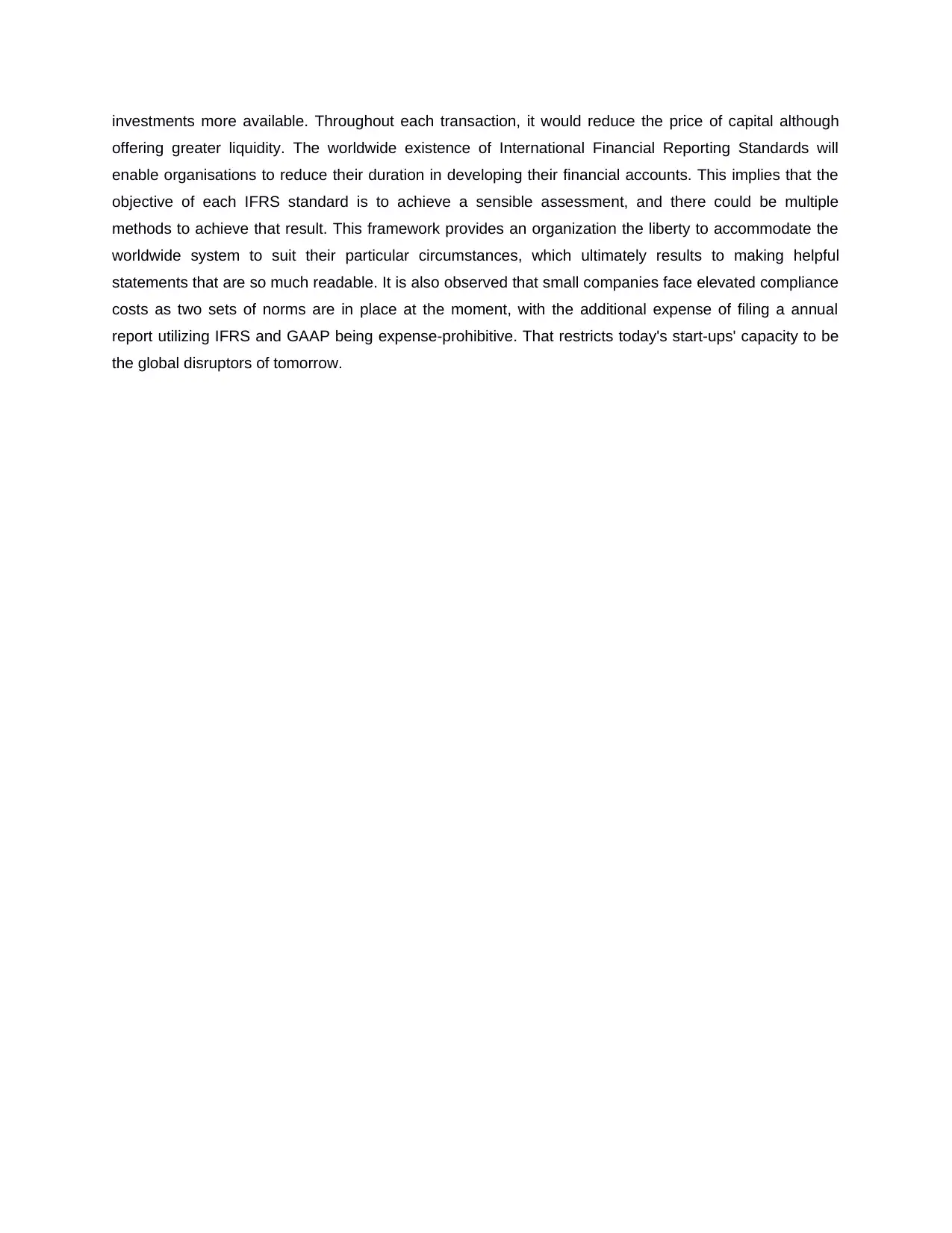
investments more available. Throughout each transaction, it would reduce the price of capital although
offering greater liquidity. The worldwide existence of International Financial Reporting Standards will
enable organisations to reduce their duration in developing their financial accounts. This implies that the
objective of each IFRS standard is to achieve a sensible assessment, and there could be multiple
methods to achieve that result. This framework provides an organization the liberty to accommodate the
worldwide system to suit their particular circumstances, which ultimately results to making helpful
statements that are so much readable. It is also observed that small companies face elevated compliance
costs as two sets of norms are in place at the moment, with the additional expense of filing a annual
report utilizing IFRS and GAAP being expense-prohibitive. That restricts today's start-ups' capacity to be
the global disruptors of tomorrow.
offering greater liquidity. The worldwide existence of International Financial Reporting Standards will
enable organisations to reduce their duration in developing their financial accounts. This implies that the
objective of each IFRS standard is to achieve a sensible assessment, and there could be multiple
methods to achieve that result. This framework provides an organization the liberty to accommodate the
worldwide system to suit their particular circumstances, which ultimately results to making helpful
statements that are so much readable. It is also observed that small companies face elevated compliance
costs as two sets of norms are in place at the moment, with the additional expense of filing a annual
report utilizing IFRS and GAAP being expense-prohibitive. That restricts today's start-ups' capacity to be
the global disruptors of tomorrow.
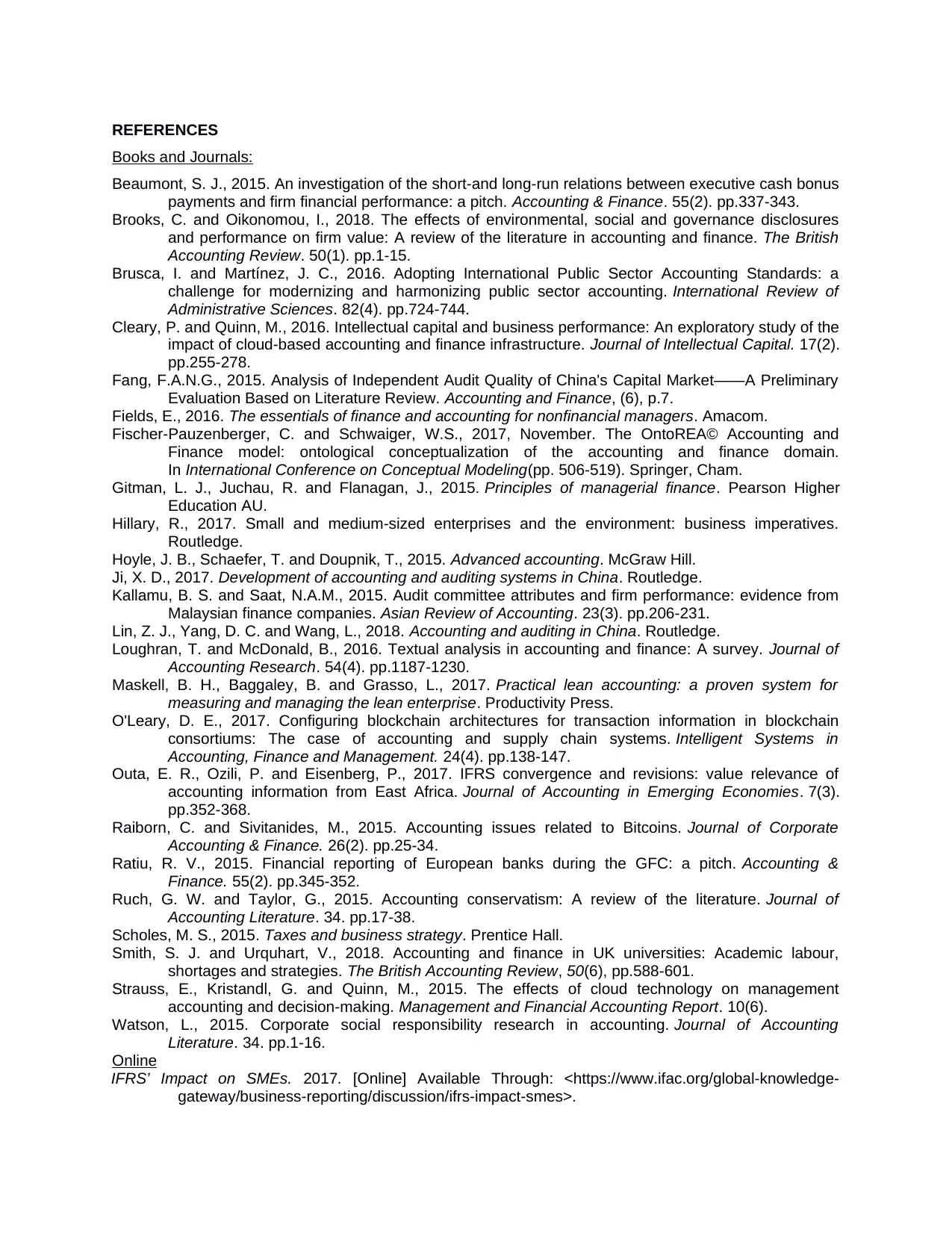
REFERENCES
Books and Journals:
Beaumont, S. J., 2015. An investigation of the short‐and long‐run relations between executive cash bonus
payments and firm financial performance: a pitch. Accounting & Finance. 55(2). pp.337-343.
Brooks, C. and Oikonomou, I., 2018. The effects of environmental, social and governance disclosures
and performance on firm value: A review of the literature in accounting and finance. The British
Accounting Review. 50(1). pp.1-15.
Brusca, I. and Martínez, J. C., 2016. Adopting International Public Sector Accounting Standards: a
challenge for modernizing and harmonizing public sector accounting. International Review of
Administrative Sciences. 82(4). pp.724-744.
Cleary, P. and Quinn, M., 2016. Intellectual capital and business performance: An exploratory study of the
impact of cloud-based accounting and finance infrastructure. Journal of Intellectual Capital. 17(2).
pp.255-278.
Fang, F.A.N.G., 2015. Analysis of Independent Audit Quality of China's Capital Market——A Preliminary
Evaluation Based on Literature Review. Accounting and Finance, (6), p.7.
Fields, E., 2016. The essentials of finance and accounting for nonfinancial managers. Amacom.
Fischer-Pauzenberger, C. and Schwaiger, W.S., 2017, November. The OntoREA© Accounting and
Finance model: ontological conceptualization of the accounting and finance domain.
In International Conference on Conceptual Modeling(pp. 506-519). Springer, Cham.
Gitman, L. J., Juchau, R. and Flanagan, J., 2015. Principles of managerial finance. Pearson Higher
Education AU.
Hillary, R., 2017. Small and medium-sized enterprises and the environment: business imperatives.
Routledge.
Hoyle, J. B., Schaefer, T. and Doupnik, T., 2015. Advanced accounting. McGraw Hill.
Ji, X. D., 2017. Development of accounting and auditing systems in China. Routledge.
Kallamu, B. S. and Saat, N.A.M., 2015. Audit committee attributes and firm performance: evidence from
Malaysian finance companies. Asian Review of Accounting. 23(3). pp.206-231.
Lin, Z. J., Yang, D. C. and Wang, L., 2018. Accounting and auditing in China. Routledge.
Loughran, T. and McDonald, B., 2016. Textual analysis in accounting and finance: A survey. Journal of
Accounting Research. 54(4). pp.1187-1230.
Maskell, B. H., Baggaley, B. and Grasso, L., 2017. Practical lean accounting: a proven system for
measuring and managing the lean enterprise. Productivity Press.
O'Leary, D. E., 2017. Configuring blockchain architectures for transaction information in blockchain
consortiums: The case of accounting and supply chain systems. Intelligent Systems in
Accounting, Finance and Management. 24(4). pp.138-147.
Outa, E. R., Ozili, P. and Eisenberg, P., 2017. IFRS convergence and revisions: value relevance of
accounting information from East Africa. Journal of Accounting in Emerging Economies. 7(3).
pp.352-368.
Raiborn, C. and Sivitanides, M., 2015. Accounting issues related to Bitcoins. Journal of Corporate
Accounting & Finance. 26(2). pp.25-34.
Ratiu, R. V., 2015. Financial reporting of European banks during the GFC: a pitch. Accounting &
Finance. 55(2). pp.345-352.
Ruch, G. W. and Taylor, G., 2015. Accounting conservatism: A review of the literature. Journal of
Accounting Literature. 34. pp.17-38.
Scholes, M. S., 2015. Taxes and business strategy. Prentice Hall.
Smith, S. J. and Urquhart, V., 2018. Accounting and finance in UK universities: Academic labour,
shortages and strategies. The British Accounting Review, 50(6), pp.588-601.
Strauss, E., Kristandl, G. and Quinn, M., 2015. The effects of cloud technology on management
accounting and decision-making. Management and Financial Accounting Report. 10(6).
Watson, L., 2015. Corporate social responsibility research in accounting. Journal of Accounting
Literature. 34. pp.1-16.
Online
IFRS’ Impact on SMEs. 2017. [Online] Available Through: <https://www.ifac.org/global-knowledge-
gateway/business-reporting/discussion/ifrs-impact-smes>.
Books and Journals:
Beaumont, S. J., 2015. An investigation of the short‐and long‐run relations between executive cash bonus
payments and firm financial performance: a pitch. Accounting & Finance. 55(2). pp.337-343.
Brooks, C. and Oikonomou, I., 2018. The effects of environmental, social and governance disclosures
and performance on firm value: A review of the literature in accounting and finance. The British
Accounting Review. 50(1). pp.1-15.
Brusca, I. and Martínez, J. C., 2016. Adopting International Public Sector Accounting Standards: a
challenge for modernizing and harmonizing public sector accounting. International Review of
Administrative Sciences. 82(4). pp.724-744.
Cleary, P. and Quinn, M., 2016. Intellectual capital and business performance: An exploratory study of the
impact of cloud-based accounting and finance infrastructure. Journal of Intellectual Capital. 17(2).
pp.255-278.
Fang, F.A.N.G., 2015. Analysis of Independent Audit Quality of China's Capital Market——A Preliminary
Evaluation Based on Literature Review. Accounting and Finance, (6), p.7.
Fields, E., 2016. The essentials of finance and accounting for nonfinancial managers. Amacom.
Fischer-Pauzenberger, C. and Schwaiger, W.S., 2017, November. The OntoREA© Accounting and
Finance model: ontological conceptualization of the accounting and finance domain.
In International Conference on Conceptual Modeling(pp. 506-519). Springer, Cham.
Gitman, L. J., Juchau, R. and Flanagan, J., 2015. Principles of managerial finance. Pearson Higher
Education AU.
Hillary, R., 2017. Small and medium-sized enterprises and the environment: business imperatives.
Routledge.
Hoyle, J. B., Schaefer, T. and Doupnik, T., 2015. Advanced accounting. McGraw Hill.
Ji, X. D., 2017. Development of accounting and auditing systems in China. Routledge.
Kallamu, B. S. and Saat, N.A.M., 2015. Audit committee attributes and firm performance: evidence from
Malaysian finance companies. Asian Review of Accounting. 23(3). pp.206-231.
Lin, Z. J., Yang, D. C. and Wang, L., 2018. Accounting and auditing in China. Routledge.
Loughran, T. and McDonald, B., 2016. Textual analysis in accounting and finance: A survey. Journal of
Accounting Research. 54(4). pp.1187-1230.
Maskell, B. H., Baggaley, B. and Grasso, L., 2017. Practical lean accounting: a proven system for
measuring and managing the lean enterprise. Productivity Press.
O'Leary, D. E., 2017. Configuring blockchain architectures for transaction information in blockchain
consortiums: The case of accounting and supply chain systems. Intelligent Systems in
Accounting, Finance and Management. 24(4). pp.138-147.
Outa, E. R., Ozili, P. and Eisenberg, P., 2017. IFRS convergence and revisions: value relevance of
accounting information from East Africa. Journal of Accounting in Emerging Economies. 7(3).
pp.352-368.
Raiborn, C. and Sivitanides, M., 2015. Accounting issues related to Bitcoins. Journal of Corporate
Accounting & Finance. 26(2). pp.25-34.
Ratiu, R. V., 2015. Financial reporting of European banks during the GFC: a pitch. Accounting &
Finance. 55(2). pp.345-352.
Ruch, G. W. and Taylor, G., 2015. Accounting conservatism: A review of the literature. Journal of
Accounting Literature. 34. pp.17-38.
Scholes, M. S., 2015. Taxes and business strategy. Prentice Hall.
Smith, S. J. and Urquhart, V., 2018. Accounting and finance in UK universities: Academic labour,
shortages and strategies. The British Accounting Review, 50(6), pp.588-601.
Strauss, E., Kristandl, G. and Quinn, M., 2015. The effects of cloud technology on management
accounting and decision-making. Management and Financial Accounting Report. 10(6).
Watson, L., 2015. Corporate social responsibility research in accounting. Journal of Accounting
Literature. 34. pp.1-16.
Online
IFRS’ Impact on SMEs. 2017. [Online] Available Through: <https://www.ifac.org/global-knowledge-
gateway/business-reporting/discussion/ifrs-impact-smes>.

About RH Amar. 2019.[Online] Available Through: <https://www.b.co.uk/company-profile/?rh-amar-
93465>.
93465>.
Secure Best Marks with AI Grader
Need help grading? Try our AI Grader for instant feedback on your assignments.
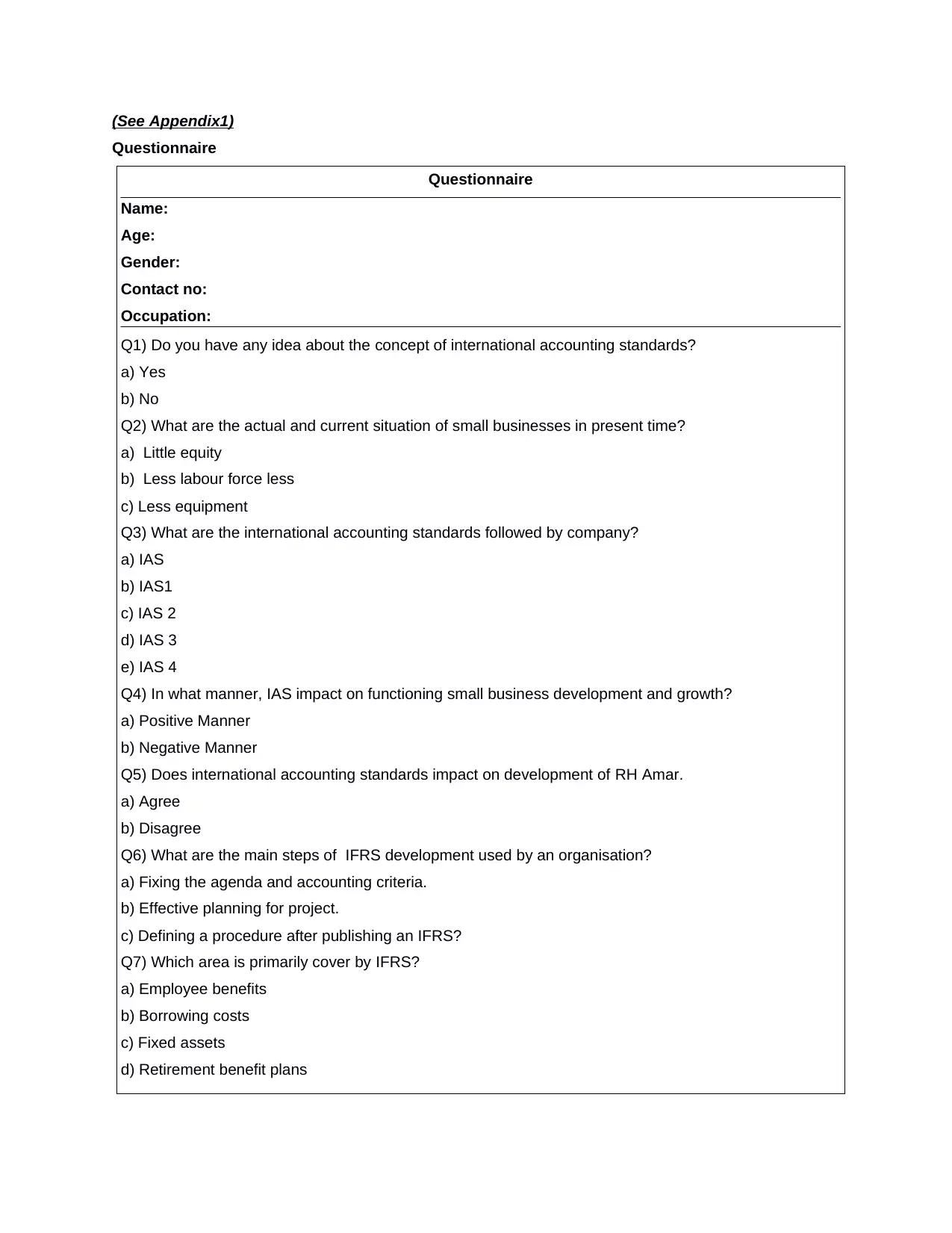
(See Appendix1)
Questionnaire
Questionnaire
Name:
Age:
Gender:
Contact no:
Occupation:
Q1) Do you have any idea about the concept of international accounting standards?
a) Yes
b) No
Q2) What are the actual and current situation of small businesses in present time?
a) Little equity
b) Less labour force less
c) Less equipment
Q3) What are the international accounting standards followed by company?
a) IAS
b) IAS1
c) IAS 2
d) IAS 3
e) IAS 4
Q4) In what manner, IAS impact on functioning small business development and growth?
a) Positive Manner
b) Negative Manner
Q5) Does international accounting standards impact on development of RH Amar.
a) Agree
b) Disagree
Q6) What are the main steps of IFRS development used by an organisation?
a) Fixing the agenda and accounting criteria.
b) Effective planning for project.
c) Defining a procedure after publishing an IFRS?
Q7) Which area is primarily cover by IFRS?
a) Employee benefits
b) Borrowing costs
c) Fixed assets
d) Retirement benefit plans
Questionnaire
Questionnaire
Name:
Age:
Gender:
Contact no:
Occupation:
Q1) Do you have any idea about the concept of international accounting standards?
a) Yes
b) No
Q2) What are the actual and current situation of small businesses in present time?
a) Little equity
b) Less labour force less
c) Less equipment
Q3) What are the international accounting standards followed by company?
a) IAS
b) IAS1
c) IAS 2
d) IAS 3
e) IAS 4
Q4) In what manner, IAS impact on functioning small business development and growth?
a) Positive Manner
b) Negative Manner
Q5) Does international accounting standards impact on development of RH Amar.
a) Agree
b) Disagree
Q6) What are the main steps of IFRS development used by an organisation?
a) Fixing the agenda and accounting criteria.
b) Effective planning for project.
c) Defining a procedure after publishing an IFRS?
Q7) Which area is primarily cover by IFRS?
a) Employee benefits
b) Borrowing costs
c) Fixed assets
d) Retirement benefit plans
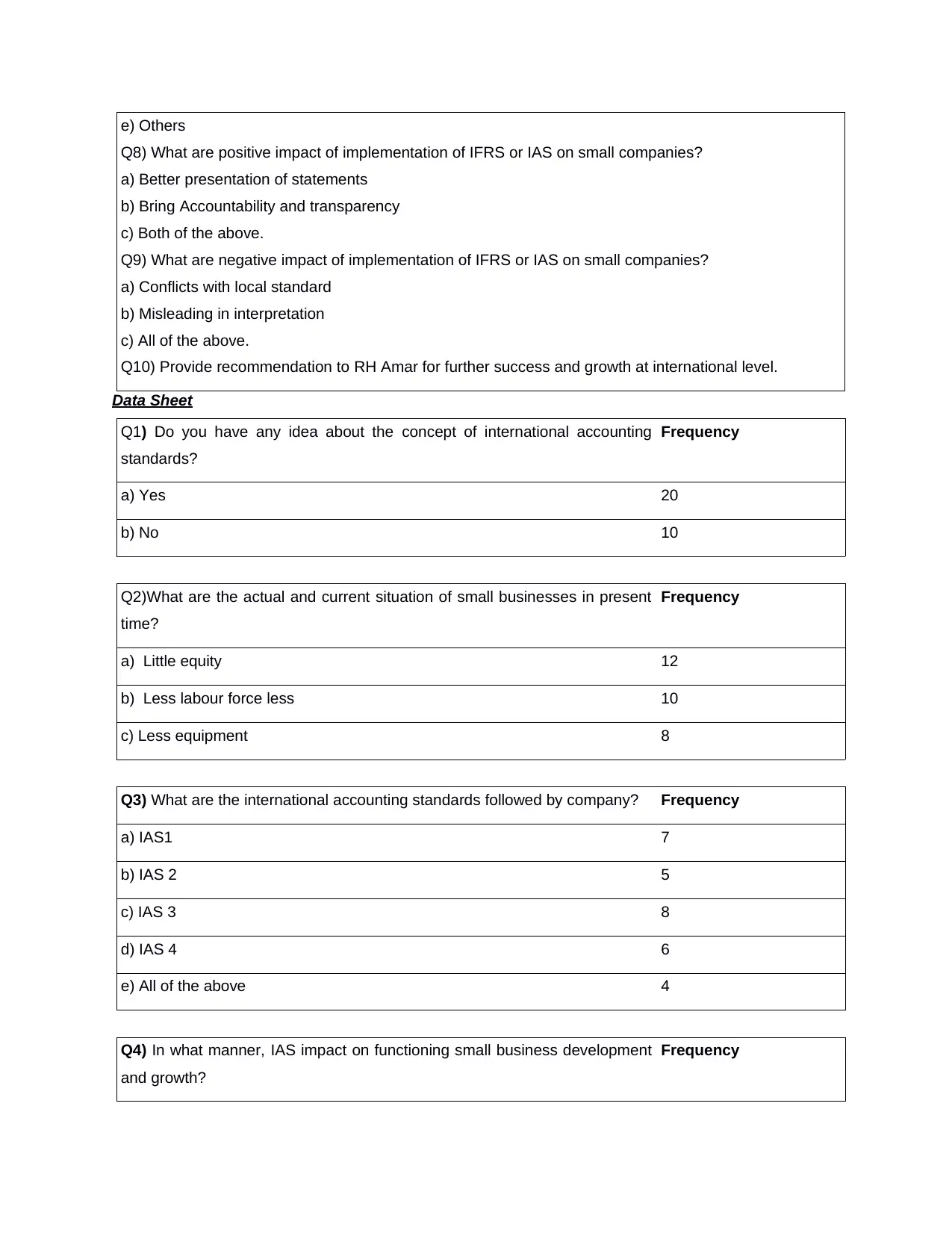
e) Others
Q8) What are positive impact of implementation of IFRS or IAS on small companies?
a) Better presentation of statements
b) Bring Accountability and transparency
c) Both of the above.
Q9) What are negative impact of implementation of IFRS or IAS on small companies?
a) Conflicts with local standard
b) Misleading in interpretation
c) All of the above.
Q10) Provide recommendation to RH Amar for further success and growth at international level.
Data Sheet
Q1) Do you have any idea about the concept of international accounting
standards?
Frequency
a) Yes 20
b) No 10
Q2)What are the actual and current situation of small businesses in present
time?
Frequency
a) Little equity 12
b) Less labour force less 10
c) Less equipment 8
Q3) What are the international accounting standards followed by company? Frequency
a) IAS1 7
b) IAS 2 5
c) IAS 3 8
d) IAS 4 6
e) All of the above 4
Q4) In what manner, IAS impact on functioning small business development
and growth?
Frequency
Q8) What are positive impact of implementation of IFRS or IAS on small companies?
a) Better presentation of statements
b) Bring Accountability and transparency
c) Both of the above.
Q9) What are negative impact of implementation of IFRS or IAS on small companies?
a) Conflicts with local standard
b) Misleading in interpretation
c) All of the above.
Q10) Provide recommendation to RH Amar for further success and growth at international level.
Data Sheet
Q1) Do you have any idea about the concept of international accounting
standards?
Frequency
a) Yes 20
b) No 10
Q2)What are the actual and current situation of small businesses in present
time?
Frequency
a) Little equity 12
b) Less labour force less 10
c) Less equipment 8
Q3) What are the international accounting standards followed by company? Frequency
a) IAS1 7
b) IAS 2 5
c) IAS 3 8
d) IAS 4 6
e) All of the above 4
Q4) In what manner, IAS impact on functioning small business development
and growth?
Frequency
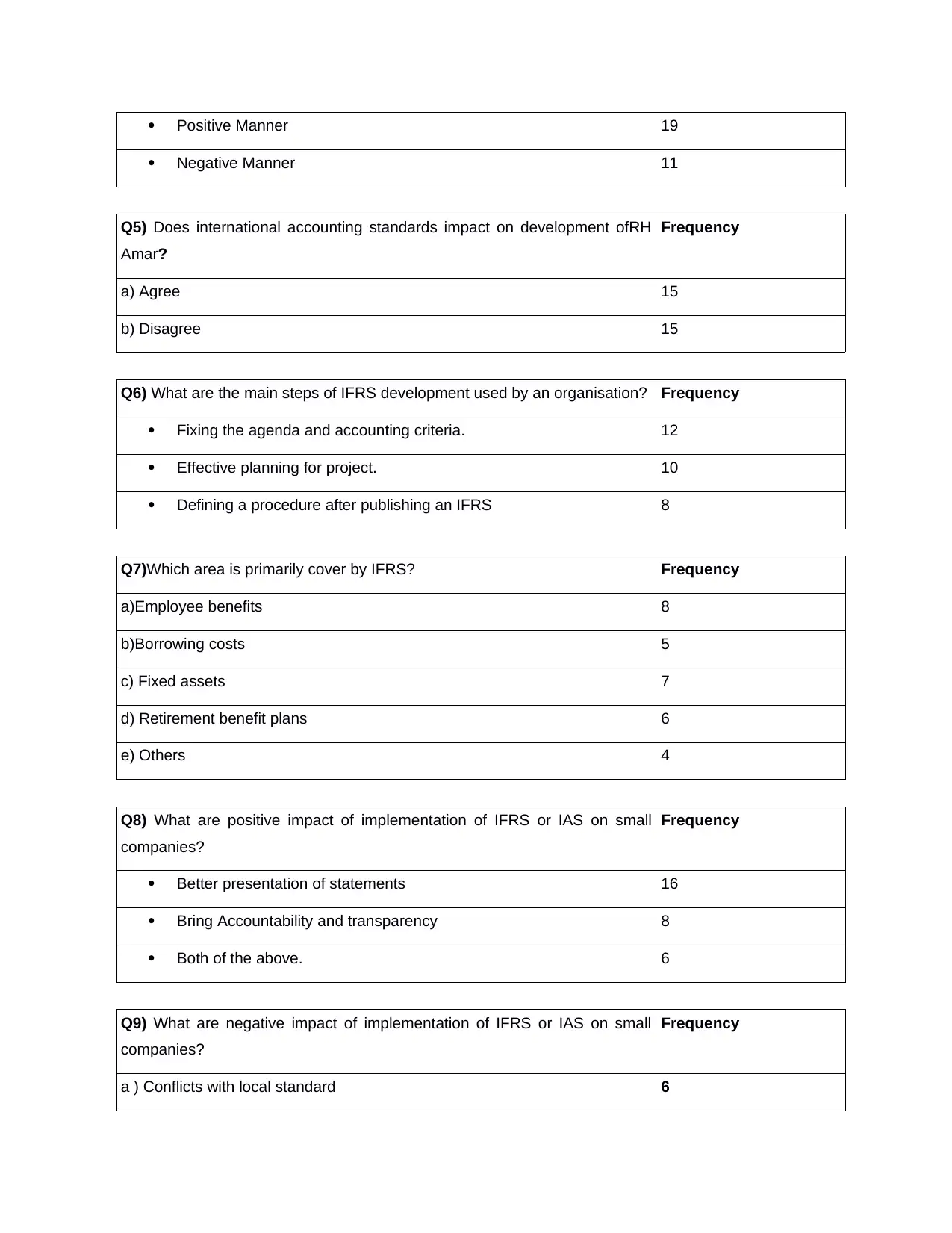
Positive Manner 19
Negative Manner 11
Q5) Does international accounting standards impact on development ofRH
Amar?
Frequency
a) Agree 15
b) Disagree 15
Q6) What are the main steps of IFRS development used by an organisation? Frequency
Fixing the agenda and accounting criteria. 12
Effective planning for project. 10
Defining a procedure after publishing an IFRS 8
Q7)Which area is primarily cover by IFRS? Frequency
a)Employee benefits 8
b)Borrowing costs 5
c) Fixed assets 7
d) Retirement benefit plans 6
e) Others 4
Q8) What are positive impact of implementation of IFRS or IAS on small
companies?
Frequency
Better presentation of statements 16
Bring Accountability and transparency 8
Both of the above. 6
Q9) What are negative impact of implementation of IFRS or IAS on small
companies?
Frequency
a ) Conflicts with local standard 6
Negative Manner 11
Q5) Does international accounting standards impact on development ofRH
Amar?
Frequency
a) Agree 15
b) Disagree 15
Q6) What are the main steps of IFRS development used by an organisation? Frequency
Fixing the agenda and accounting criteria. 12
Effective planning for project. 10
Defining a procedure after publishing an IFRS 8
Q7)Which area is primarily cover by IFRS? Frequency
a)Employee benefits 8
b)Borrowing costs 5
c) Fixed assets 7
d) Retirement benefit plans 6
e) Others 4
Q8) What are positive impact of implementation of IFRS or IAS on small
companies?
Frequency
Better presentation of statements 16
Bring Accountability and transparency 8
Both of the above. 6
Q9) What are negative impact of implementation of IFRS or IAS on small
companies?
Frequency
a ) Conflicts with local standard 6
Paraphrase This Document
Need a fresh take? Get an instant paraphrase of this document with our AI Paraphraser
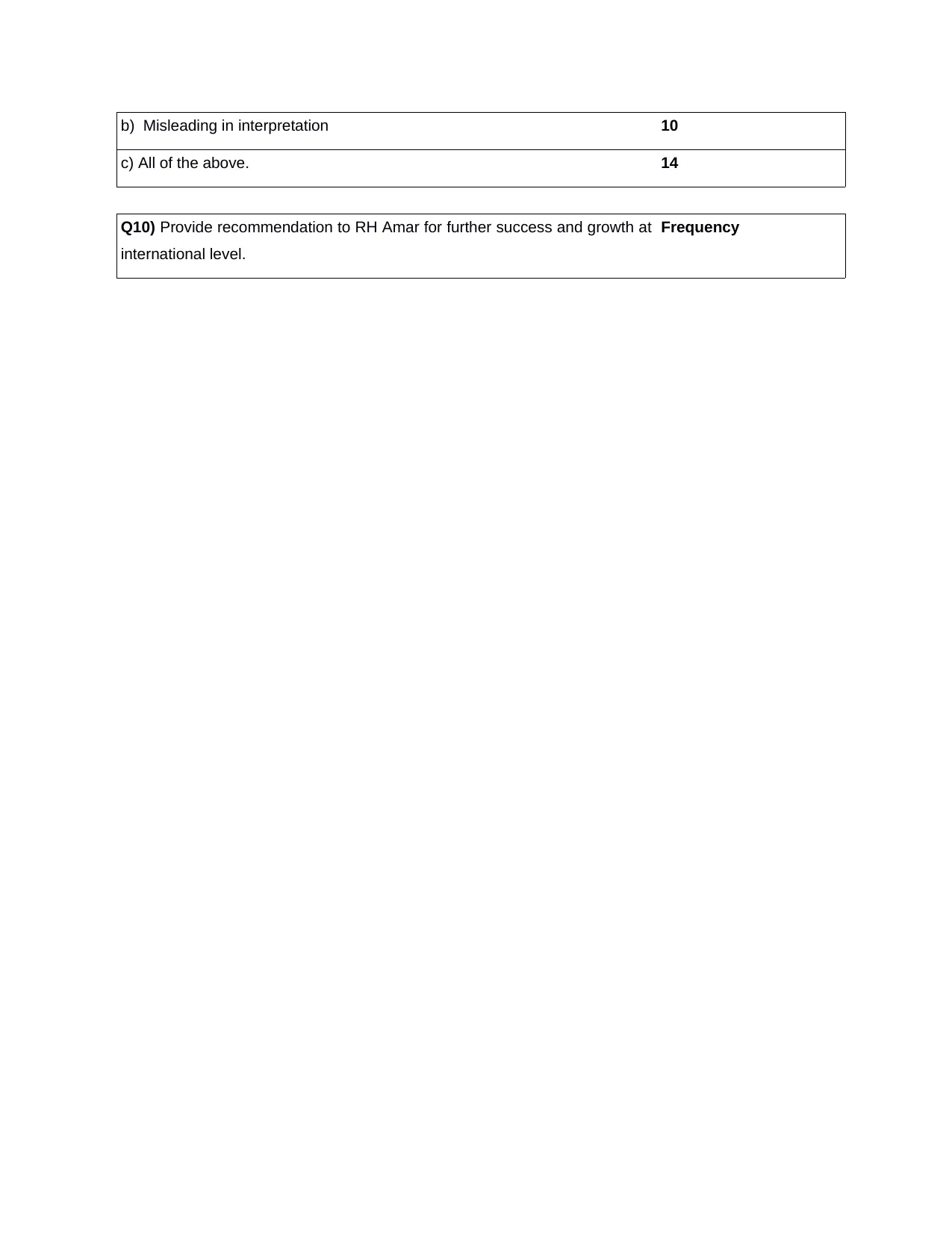
b) Misleading in interpretation 10
c) All of the above. 14
Q10) Provide recommendation to RH Amar for further success and growth at
international level.
Frequency
c) All of the above. 14
Q10) Provide recommendation to RH Amar for further success and growth at
international level.
Frequency
1 out of 26
Related Documents
Your All-in-One AI-Powered Toolkit for Academic Success.
+13062052269
info@desklib.com
Available 24*7 on WhatsApp / Email
![[object Object]](/_next/static/media/star-bottom.7253800d.svg)
Unlock your academic potential
© 2024 | Zucol Services PVT LTD | All rights reserved.





